- Skip to main content
- Skip to primary sidebar
- Skip to footer
- QuestionPro

- Solutions Industries Gaming Automotive Sports and events Education Government Travel & Hospitality Financial Services Healthcare Cannabis Technology Use Case AskWhy Communities Audience Contactless surveys Mobile LivePolls Member Experience GDPR Positive People Science 360 Feedback Surveys
- Resources Blog eBooks Survey Templates Case Studies Training Help center
Home Market Research

Online research: Definition, Methods, Types and Execution

Online survey research is much more impactful than traditional research, considering the ease of access and cost savings they come with. The response rates received for online research are much higher than the others as the respondents are assured that their identity will be protected.
There’s constant progress in the field of online survey research with the progress that’s happening on the internet and social media. Social media has been a catalyst in the entire process of online research regarding access to databases and the experiments that can be conducted on this platform.
What is Online Research?
Online research is a research method that involves the collection of information from the internet. With the advent of the internet, the traditional pen-and-paper research techniques have taken a backseat and made room for online research design .
Online surveys , online polls , questionnaires , forms , and focus groups are various tools of online research that are vital in gathering essential information for market research . The internet has created impressive avenues for small and large businesses to conduct market research with zero to a minimum investment. Online research can be carried out for product testing, targeting an audience, database mining, customer satisfaction et al.
LEARN ABOUT: Market research industry
5 Online Research Methods and Techniques:
Researchers and statisticians collect data from respondents using various online research techniques. They are often called internet research or web-based research methods. Many of these research methods are already being used in one way or another but are being revived for online mediums. The latest in this line of online research methods in social media research, as it offers extended levels of complexities and, thus, new avenues for research.
Researchers extensively use 5 such online research methods due to the precise nature of the offered results.
- Online focus group: A subset of the online research techniques, online focus groups are methods usually used for B2B research, consumer research and political research. A moderator is assigned to conduct and supervise the focus group who invites pre-selected and qualified participants who represent a specific area of interest to be a part of this focus group at a particular time. The respondents are usually incentivized to be a part of the discussion, which usually is an hour and 90 minutes.
LEARN ABOUT: B2B Online Panels
- Online interview: This online research method is quite similar to the face-to-face interview methods yet different in terms of the required standard practices, understanding with respondents, and sampling. Online interviews are organized using various computer-mediated communication (CMC), essentially SMS or Email. Based on the response time for these interviews, they’re classified into synchronous and asynchronous methods.Synchronous online interviews are carried out via mediums such as online chat, where the responses are received in real-time. Asynchronous online interviews are those that happen over Email, where the responses are usually not in real-time. Just like face-to-face interviews, online interviews probe into respondents’ thoughts and feedback about a particular topic to get insights into their experiences, ideas, or attitudes.
- Online qualitative research: Other than the mainstream online focus groups and online interviews, there are various aspects of online qualitative research . These aspects include blogs, mobile diaries , and communities . These methods contribute toward cost and time savings and are supremely convenient for the researchers to gather information for their research topics. The level of sophistication that online qualitative research methods bring to the table is superior to any other traditional forms as the respondents can be either recruited from existing databases, or panels or can be added by conducting surveys . LEARN MORE: Qualitative Research Questions and Questionnaires
- Online text analysis: This analysis technique is an extension of text analysis which exists since the 17th century which is a collection of various online research examples used to derive insights from content available online. By using this online research technique, researchers can explain penned, verbal or graphic communication formats. Categories such as web pages, paragraphs, sentences, quasi-sentences, documents, etc. It is most often used for quantitative research but for better interpretation of the text, researchers also use qualitative techniques.
LEARN ABOUT: Qualitative Interview
- Social network analysis: Social network analysis is an emerging online research technique which is gaining acceptance due to the increased adoption of social networking platforms. By conducting social network analysis, a researcher can map and measure flows and relationships between people, organizations, URLs, groups or computers using graph theory. For instance, the latest meme culture has developed new social structures in which the people associated are termed as “nodes” and memes are the “links” between these nodes.
LEARN ABOUT: Best Data Collection Tools
Types of online research:
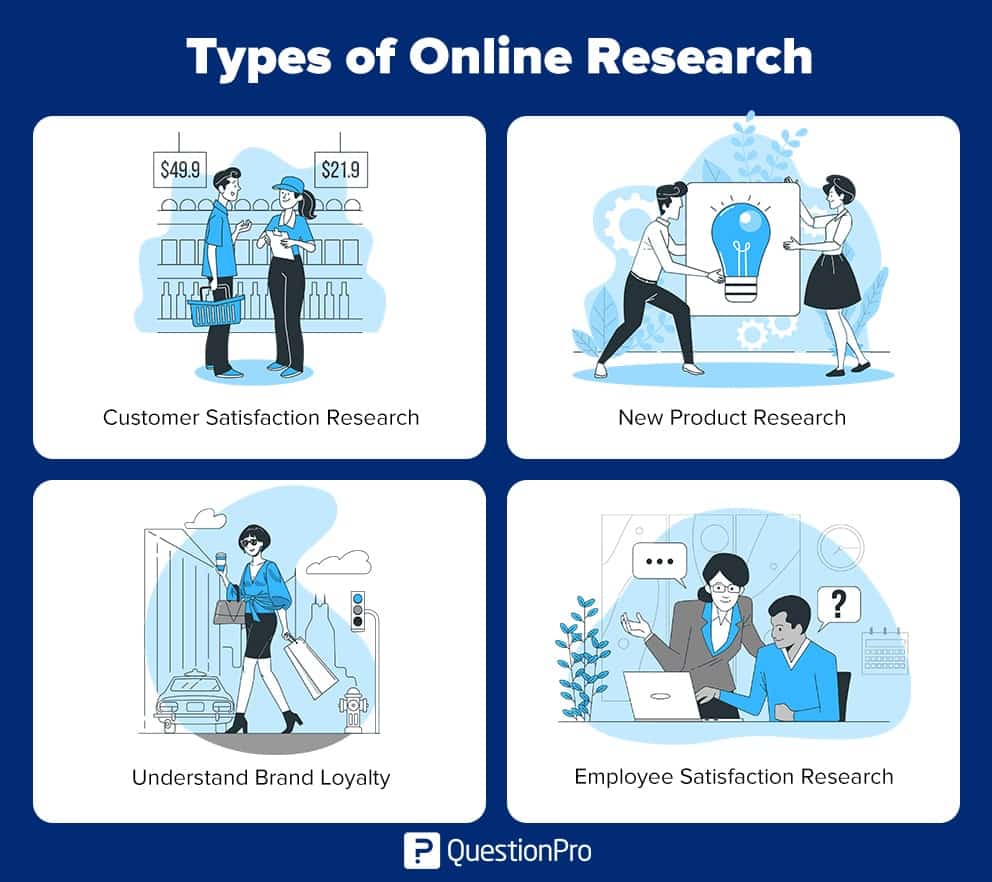
- Customer satisfaction research: Earlier, this type of research used to be conducted over phone calls but nowadays, the customers are accustomed to getting mail asking them to give their feedback on their recent experience with an organization. For instance, if you own a newly opened restaurant, you’d want to know customer satisfaction . You can either have a survey ready for them to fill out after their meal, send it out after taking their email address or use the offline app to conduct the survey.
- New product research: The launch of a new product can be unnerving. Understanding whether a new product will succeed with the target audience is much needed. New product research can be carried out by testing the product with a group of selected guinea pigs and collecting feedback almost immediately. It can be highly effective when conducting research for a new mall outlet (read: Walmart!), launching a car variant, or introducing adding new credit card options.
- Understand brand loyalty: Many small and big businesses survive merely on brand loyalty . It’s undoubtedly a big deal but to every organization needs to work on it to either maintain or improve it. Conduct online research to know what attracts a customer to a particular brand or the points that are currently keeping them from being loyal to your brand.
- Employee engagement and employee satisfaction research: Understanding what employees think about working with your organization is the key to success. The mood and morale of the employees must be tracked regularly so that they effectively contribute to the growth of the company. Surveys should be sent to improve employee engagement and also to strive to maintain employee satisfaction .
Learn More: Data Collection Methods: Types & Examples
Things to keep in mind for online survey research
Online survey research is one of the most impactful ways to carry out web-based research that yield effective results. Here are a few points that all organizations should take care of while designing an online survey for research:
Give open-ended questions a miss:
A respondent needs to think before submitting open-ended questions, so the time taken for completion can increase. This can annoy them to a point where they’d simply quit the survey. Yes-No questions, multiple choice questions, or ranking questions will be much easier for respondents to fill out and as effective as open-ended questions .
Show urgency but also be tolerant:
In case you want a response for something important, sending more than one invitation for respondents to fill out is alright. But, a prerequisite for this is that your database should be very well aware of this, and they should have no objection to it. Most importantly, be patient with the results once you’ve conducted an online survey. Appoint someone from the team who will take care of the entire process of conducting this survey.
Detailed surveys produce better results:
Survey takers can sit through a survey that would take them a maximum of 25 minutes. They would usually quit to never return, even for the surveys that you might send out in the future. The inclusion of drop-down questions or multiple choice questions (with accurate options) will help reduce the survey size and, in turn, the time invested by the survey takers.
Online Research Advantages:
- Access to data across the globe: The Internet is an elaborate platform for researchers to invest their time in retrieving crucial information that would otherwise consume a lot of their time. It is straightforward for them to conduct research skills even if they’re lazing on their couch and have deadlines.
- Minimum investment of time and resources: Online mediums have become the numero uno resort for individuals to look up information to broaden their horizons of knowledge. There’s information being updated daily, and researchers latch onto this information for their benefit. It has eased the process of publishing and collecting information and thus saves time and money.
- Central pool of facts and figures: Researchers and statisticians keep searching for updated information on various important topics. Students explore the internet for academic purposes, which is the most significant edge the internet offers.
- Capable tools for collecting information: Surveys, questionnaires, and polls are being conducted via online mediums like emails or QR codes, or embedded websites to gather or spread vital information.
Know more about the various online research methods.
LEARN ABOUT: 12 Best Tools for Researchers
QuestionPro’s robust suite of research tools provides you with all you need to derive research results. Our online survey platform includes custom point-and-click logic and advanced question types.
LEARN ABOUT: Market research vs marketing research
LEARN MORE FREE TRIAL
MORE LIKE THIS

Maximize Employee Feedback with QuestionPro Workforce’s Slack Integration
Nov 6, 2024

2024 Presidential Election Polls: Harris vs. Trump
Nov 5, 2024
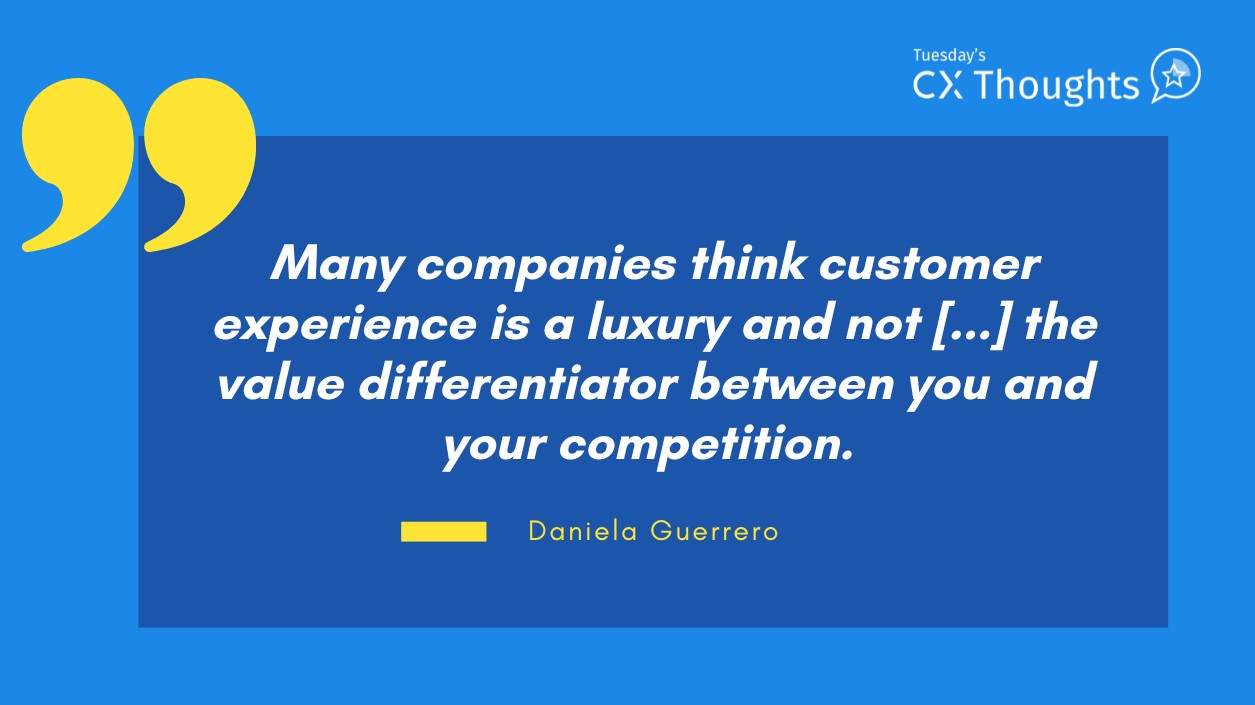
Your First Question Should Be Anything But, “Is The Car Okay?” — Tuesday CX Thoughts

QuestionPro vs. Qualtrics: Who Offers the Best 360-Degree Feedback Platform for Your Needs?
Nov 4, 2024
Other categories
- Academic Research
- Artificial Intelligence
- Assessments
- Brand Awareness
- Case Studies
- Communities
- Consumer Insights
- Customer effort score
- Customer Engagement
- Customer Experience
- Customer Loyalty
- Customer Research
- Customer Satisfaction
- Employee Benefits
- Employee Engagement
- Employee Retention
- Friday Five
- General Data Protection Regulation
- Insights Hub
- Life@QuestionPro
- Market Research
- Mobile diaries
- Mobile Surveys
- New Features
- Online Communities
- Question Types
- Questionnaire
- QuestionPro Products
- Release Notes
- Research Tools and Apps
- Revenue at Risk
- Survey Templates
- Training Tips
- Tuesday CX Thoughts (TCXT)
- Uncategorized
- What’s Coming Up
- Workforce Intelligence

Unicaf Scholarships offer students the opportunity to further their education with affordable, high-quality degrees
- Global Network
- Recognition, Accreditation and Memberships
Study through Unicaf with one of its partner universities
- University Partners
- Programme Finder
- Professional Courses
- Graduation Ceremonies
- Online Experience
- On-campus Teaching
- Student Testimonials
- Global Organisation
- Our Faculty
- Programme Advising
- News & Events
- Unicaf in 5 Minutes
- The Unicaf Mobile App
- Virtual Learning Environment
- Online Learning
Amazing Opportunity to earn a Scholarship
- Apply For A Unicaf Scholarship
- Scholarship
- Unicaf Referral Programme
- Corporate Scholarship Scheme
Research with us
- Research Agenda
- Research Centres Unicaf Research and Innovation Centre in Zambia Research Centre in Malawi
- Doctoral Research Groups
- Research Newsletter
- Unicaf Online Journal
- Conferences Unicaf University Graduate Conference (UGraC) Unicaf Master’s Conference (UMC) Unicaf University National Symposium on Dementia in Zambia
- Thesis Publications
- Publications Faculty Students/Alumni
- Scholarships
- Research Centres
- Unicaf Research and Innovation Centre in Zambia
- Research Centre in Malawi
- Conferences
- Unicaf University Graduate Conference (UGraC)
- Unicaf Master’s Conference (UMC)
- Unicaf University National Symposium on Dementia in Zambia
- Publications
- Students/Alumni
- Français ( French )
How can we help?
Strategies for building effective online research skills.

- Amazing Opportunity to earn a Scholarship. Apply Now!
- Complete the following required fields to apply for a Unicaf scholarship for the programme of your choice.
- First Name *
- Last Name *
- Email Address *
- How can we get in touch?
- Fill out your contact details and one of our student advisors will get in touch with you soon.
- Country of Residence * Country of Residence* Ascension Island Andorra United Arab Emirates Afghanistan Antigua and Barbuda Anguilla Albania Armenia Netherlands Antilles Angola Antarctica Argentina American Samoa Austria Australia Aruba Ãland Islands Azerbaijan Bosnia and Herzegovina Barbados Bangladesh Belgium Burkina Faso Bulgaria Bahrain Burundi Benin Saint Barthélemy Bermuda Brunei Darussalam Bolivia Bonaire Brazil Bahamas Bhutan Bouvet Island Botswana Belarus Belize Canada Cocos (Keeling) Islands Congo, The Democratic Republic of The Central African Republic Congo Switzerland Cote D'ivoire Cook Islands Chile Cameroon China Colombia Costa Rica Cuba Cape Verde Curacao Christmas Island Cyprus Czech Republic Germany Diego Garcia Djibouti Denmark Dominica Dominican Republic Algeria Ceuta and Melilla Ecuador Estonia Egypt Western Sahara Eritrea Spain Ethiopia Finland Fiji Falkland Islands (Malvinas) Micronesia, Federated States of Faroe Islands France Gabon United Kingdom Grenada Georgia French Guiana Guernsey Ghana Gibraltar Greenland Gambia Guinea Guadeloupe Equatorial Guinea Greece South Georgia and The South Sandwich Islands Guatemala Guam Guinea-Bissau Guyana Hong Kong Heard Island and Mcdonald Islands Honduras Croatia Haiti Hungary Canary Islands Indonesia Ireland Israel Isle of Man India British Indian Ocean Territory Iraq Iran, Islamic Republic of Iceland Italy Jersey Jamaica Jordan Japan Kenya Kyrgyzstan Cambodia Kiribati Comoros Saint Kitts and Nevis Korea, Democratic People's Republic South Korea Kuwait Cayman Islands Kazakhstan Lao People's Democratic Republic Lebanon Saint Lucia Liechtenstein Sri Lanka Liberia Lesotho Lithuania Luxembourg Latvia Libya Morocco Monaco Moldova, Republic of Montenegro Saint Martin Madagascar Marshall Islands Republic of North Macedonia Mali Myanmar (Burma) Mongolia Macau Northern Mariana Islands Martinique Mauritania Montserrat Malta Mauritius Maldives Malawi Mexico Malaysia Mozambique Namibia New Caledonia Niger Norfolk Island Nigeria Nicaragua Netherlands Norway Nepal Nauru Niue New Zealand Oman Panama Peru French Polynesia Papua New Guinea Philippines Pakistan Poland St. Pierre and Miquelon Pitcairn Island Puerto Rico Palestinian Territory, Occupied Portugal Palau Paraguay Qatar Reunion Island Romania Serbia Russian Federation Rwanda Saudi Arabia Solomon Islands Seychelles Sudan Sweden Singapore Saint Helena Slovenia Svalbard and Jan Mayen Islands Slovak Republic Sierra Leone San Marino Senegal Somalia Suriname South Sudan Sao Tome and Principe El Salvador Sint Maarten Syrian Arab Republic The Kingdom of Eswatini Tristan da Cunha Turks and Caicos Islands Chad French Southern Territories Togo Thailand Tajikistan Tokelau Timor-Leste Turkmenistan Tunisia Tonga Turkey Trinidad and Tobago Tuvalu Taiwan Tanzania Ukraine Uganda US Minor Outlying Islands United States Uruguay Uzbekistan Holy See (City Vatican State) Saint Vincent and The Grenadines Venezuela Virgin Islands (British) Virgin Islands (USA) Vietnam Vanuatu Wallis and Futuna Samoa Kosovo Yemen Mayotte South Africa Zambia Zimbabwe
- Phone Number *
- What is your programme of choice?
- Select the programme you would like to receive more information about, and provide us with your current education level.
- Choose your Programme * Choose your Programme* MBA LLM MSc Big Data Technologies MSc Business Psychology MSc Computer Science MSc Construction Engineering Management MSc Data Science MSc Information Security and Digital Forensics MSc in International Business Management MSc International Relations MSc in Oil and Gas with Energy Management MA in Criminology and Social Policy MA in Education MA in Human Resource Management MA in International Relations MA in Leadership in Education MA in Mass Communications MA in Nursing Master of Business Administration Master of Laws MSc in Civil Engineering MSc in Computing and Information Systems MSc in Digital Marketing MSc in International Public Health MSc in International Transport, Trade and Logistics MSc in Project Management MSc in Psychology Postgraduate Certificate in Education (International) Master of Business Administration MSc Public Health LLB (Hons) Law BA (Hons) Business Management BSc (Hons) Computing BSc (Hons) International Nursing [Progression Route] Master of Business Administration (MBA) - General Master of Business Administration (MBA) - Finance Master of Business Administration (MBA) - Health Management Master of Business Administration (MBA) - Management Master of Business Administration (MBA) - Management Information Systems Master of Business Administration (MBA) - Marketing Master of Business Administration (MBA) - Oil, Gas and Energy Management Master of Arts (MA) in Education Master of Public Administration (MPA) Master of Public Health (MPH) Master of Science (MSc) in Organisational Psychology Doctor of Business Administration (DBA) Doctor of Education (EdD) Doctor of Philosophy (PhD) in Accounting and Finance Doctor of Philosophy (PhD) in Business Administration Doctor of Philosophy (PhD) in Education Doctor of Philosophy (PhD) in Information Technology Doctor of Philosophy (PhD) in Marketing Management Bachelor of Arts (BA) in Business Administration Bachelor of Arts (BA) in Economics and Business Bachelor of Arts (BA) in Hospitality Management Bachelor of Education (B.Ed.) in Primary Education Bachelor of Education (B.Ed.) in Primary Education (Upgrading) Bachelor of Science (BSc) in Accounting Bachelor of Science (BSc) in Computer Science Bachelor of Science (BSc) in Finance Bachelor of Science (BSc) in Supply Chain Management and Logistics Master of Business Administration Master of Business Administration - Finance Master of Business Administration - Health Management Master of Business Administration – Human Resource Management Master of Business Administration - Management Master of Business Administration - Management Information Systems Master of Business Administration - Marketing Master of Business Administration - Oil, Gas and Energy Management Master of Business Administration - Project Management Master of Arts in Educational Leadership and Management Master of Arts in English Language and Literature Master of Laws (LLM) Master of Public Administration Master of Science in Computer Science Master of Science in Healthcare Management - ZM Master of Science in Managerial Psychology Master of Science in Sustainable Development Master of Science in Web Design and Development Master of Education Doctorate of Business Administration (DBA) Doctorate of Education (EdD) Doctor of Philosophy (PhD) – Business- ZM Doctor of Philosophy (PhD) - Education Doctor of Philosophy (PhD) - Law and Politics Doctor of Philosophy (PhD) - Public Health Bachelor in Hospitality Management Bachelor in Marketing Bachelor of Arts in English Language and Literature Bachelor of Business Administration - ZM Bachelor of Education in Pre-Primary Education Bachelor of Education in Primary Education Bachelor of Laws (LLB) Bachelor of Science in Accounting and Finance Bachelor of Science in Accounting and Finance - ACCA
- Current Level of Education * Current Level of Education* GCE 'A levels' or High School Diploma BTEC HND Foundation degree Bachelor degree Postgraduate certificate Postgraduate diploma Master‘s degree Doctoral Degree Other
- Consent * I agree to the Terms and Conditions , the Privacy Policy , the Cookie Policy and the Recording Policy (Agreement to the terms is required to submit form) *
The digital era is deeply embedded in the structure of today’s universities, demanding that students cultivate effective online research skills. In an age where information is abundant but discernment is paramount, mastering the art of online research is a foundational skill for academic success. This article explores key strategies to empower university students in building effective online research skills, navigating the vast expanse of digital resources with confidence and proficiency.
1. Define your research for the assignment
Your research according to the assignment is a crucial step in the academic journey. It involves clearly articulating the scope, objectives, and methodology of your investigation in alignment with the assignment’s requirements. This process necessitates a concise yet comprehensive explanation of the research question, the significance of the study, and the anticipated outcomes. By meticulously defining your research, you not only fulfil the assignment criteria but also lay a solid foundation for a focused and purposeful scholarly inquiry.
2. Break down the assignment
Breaking down the assignment is vital for academic success. It involves dissecting the prompt to understand its key components, tasks, and deadlines. This process ensures a clear comprehension of expectations, enabling a systematic and organised approach to research and writing. It’s a foundational step for meeting assignment criteria efficiently.
3. Evaluate your sources
Evaluating sources is crucial for reliable research. It involves assessing credibility, reliability, and relevance. Scrutinising authors’ authority, publication venues, and checking for bias ensures trustworthy information. This process is fundamental for producing well-informed and academically sound work.
4. Avoid plagiarism
Avoiding plagiarism is essential in academic writing. It involves properly crediting sources for ideas, quotes, or paraphrased content. Follow the prescribed citation style, take detailed notes, and uphold academic honesty to ensure the integrity of your work.
5. Consult and collaborate with a librarian
Collaborating with a librarian is essential for effective research. Librarians offer expertise in navigating resources, refining research queries, and accessing scholarly materials. Their guidance enhances the quality of your research, ensuring you make the most of available resources with precision.
6. Use library databases
Using library databases is crucial for credible research. They provide access to scholarly articles and resources not easily found through general searches, ensuring the reliability of the information you include in your work and enhancing the overall quality of your research.
7. Practise effective reading
Effective reading is fundamental for academic success. It involves purposeful, focused reading, emphasising comprehension and critical analysis. This skill enhances the ability to extract meaningful insights from texts, contributing to a deeper understanding of the subject matter and facilitating more informed research and writing.
In conclusion, honing effective online research skills is paramount in the contemporary academic landscape. These skills not only meet the immediate demands of academic assignments but also equip learners for a lifelong journey of continuous learning and informed inquiry. As educational institutions, including online platforms like Unicaf , integrate these strategies into their programmes, they play a pivotal role in shaping a generation of researchers and scholars adept at harnessing the power of online resources for academic excellence. Ultimately, building effective online research skills is not just a means to an end; it’s a transformative journey towards becoming astute, discerning, and empowered contributors to the world of knowledge.
To read more interesting articles, feel free to visit Unicaf’s Blog page !
Learn by Subject
Learn how you can earn a scholarship., earn an internationally recognised degree from the comfort of your home., continue learning.
How to Use Social Media for Professional Networking
04 Nov 2024 By Andrew Evgeniou

Understanding Different Learning Styles
01 Nov 2024 By Andrew Evgeniou

How Online Education is Bridging the Skills Gap in Africa
Teaching Students Better Online Research Skills
- Share article
Sara Shaw, an elementary school teacher in Avon, Mass., realized she needed to teach online research skills several years ago when her students kept turning in projects riddled with misinformation. The flawed material often came from websites the students used. They took the information as fact, when it often was just someone’s personal opinion.
Ms. Shaw thinks teaching online research skills is even more critical than it was just a few years ago. More than ever, information is literally at the fingertips of students through smartphones, tablet computers, and other digital devices.
“They will go on Google and type a word, and that is the extent of their research skills,” said Ms. Shaw, who taught 5th grade for 10 years and now teaches special education at Ralph D. Butler Elementary School. “There is so much more to doing research on the Internet.”
She is one of many teachers and librarians who are explicitly teaching online research skills, such as how to evaluate a website’s credibility, how to use precise keywords, and how to better mine search engines and databases.
In November 2012, the Pew Research Center’s Internet & American Life Project released a study that surveyed 2,067 Advanced Placement and National Writing Project teachers. It found that while most teachers agreed that the Internet provides a wealth of information to students, they also said students often don’t have the digital-literacy skills to wade through that information. Forty-seven percent of the teachers surveyed said they “strongly agree” and another 44 percent said they “somewhat believe” that courses and content focusing on digital literacy should be incorporated into the school curriculum.
Smart Searching
Teaching students to be savvy online researchers starts with knowing how to use key words. That is something 6th grader Katie Lacey has worked hard to master.
“You need precise words,” said Katie, a student at Albuquerque Academy, a private school for grades 6-12 in New Mexico. “If I’m looking up the John F. Kennedy assassination, I have to use those words. If I type in just Kennedy assassination, I could get information on Robert Kennedy.”
Another important skill to teach students is how to predict the results they expect to see when they type in search terms, said Tasha Bergson-Michelson, a librarian who works for the Google Search Education team at the technology company’s headquarters in Mountain View, Calif. Doing that can help them know when they may need to change their terms, she said.
In addition, Ms. Bergson-Michelson advises students to skim search results for words that pop up, especially unfamiliar words. People have a tendency to skip over words they don’t know, she said. But those words, when added to search terms, can lead to more meaningful results. For instance, if a student wanted to find information on immigrants who send money back to their home countries, the term “remittances” comes up on search results.
“When you change the search to include the word “remittance,” immediately the type of sources are qualitatively different and more suited for an academic or scholarly pursuit,” Ms. Bergson-Michelson said.
Using search operators, words, or symbols that join key words to form a more complex query can make searching more focused.
Students can put quotation marks around their search terms to get results that include the exact wording. A minus sign eliminates something from a search. For instance, if students wanted to find information about the planet Saturn, but not the car of that name, they could type “Saturn-car” to narrow their results. Using “and” between search terms can give results that focus on two subjects, such as Martin Luther King Jr. and Malcolm X.
Choosing Search Engines
Finding the right search engine or database is also an important step in conducting online research, said Frances Jacobson Harris, a librarian at University Laboratory High School in Urbana, Ill.
She encourages students to use Google Scholar, which includes academic and scholarly sources of information. Google Books allows searchers to read pages from books, and if the information is useful, a searcher can then find the book in a library collection.
Gloria Ha, a junior at University Laboratory High School, said she first started learning about effective search techniques in 8th grade. Knowing how to search has made her more thoughtful in her approaches to finding information online.
“I usually start with Google Scholar or Google just to figure out what the topic is. Once I have a better idea, I’ll go deeper,” she said. “For example, if it’s a history paper, I’ll use the online library catalog, or sometimes there are e-books online through the university.”
Ms. Harris teaches students how to access the invisible Web, databases that schools and libraries pay a fee to access. Those databases include scholarly articles, academic journals, online encyclopedias, archived editions of periodicals such as The New York Times , and other resources.
Some teachers steer students toward sites and search engines written specifically for children.
For example, the Kentucky Virtual Library , a consortium of libraries that provides residents of the state access to online databases—has a portal for K-12 students that outlines the steps for conducting online research, including how to use key words and how to organize information into notes, that is written in student-friendly language and designed to appeal visually to young children.
The portal also allows young users to access databases geared to children, including Searchasaurus and Grolier Online.
“They are more likely to get the right information at their reading level than simply going on Google,” said Enid Wohlstein, the director of the library, which is based in Frankfort.
Ed Baklini, a 6th grade history teacher at Albuquerque Academy in New Mexico, advises his students when using Google to type in a key word and the word “kid” after it. Doing so pulls up results for younger students. Mr. Baklini also directs them to free databases such as an educational site managed by the Lone Star College System in Texas that contains information about American history decade by decade.
“When you go to one of these sites, there are hundreds of other trusted links to go to,” he said. “This information comes from librarians and teachers who have taught history.”
Evaluating Websites
Just as critical as smart searching is evaluating the information on the Web. Students can take specific steps to dissect a website, such as checking whether its URL ends in a .com, .org, .gov, or .edu.
“If it’s from a university, museum, government, or some state run agency, then it’s pretty valid,” Ms. Shaw of Butler Elementary School said. “If it’s someone’s personal website, how do you know what that person is saying is true?”
In any case, students should approach websites with a critical eye.
“They should ask themselves while searching on sites: Who wrote this? What is the perspective of the person who wrote this?” said Rebecca Randall, the vice president of education programs for Common Sense Media , a San Francisco-based nonprofit group that studies the effects of media and technology on young people.
“Or else while searching for information on African-American history, they could wind up on the site for the Ku Klux Klan.”
It’s also important to know if a site is commercial. If so, it may be slanted toward having users buy products.
“Not that advertising on a site makes it less credible,” Ms. Randall said. “But it’s just another point to consider when looking at information. What is the intent of the information?”
When students take the time to approach their Web research thoughtfully, they sometimes encounter websites that are biased. Ms. Harris, the University Laboratory High librarian, recalls working with a student who was writing a paper on George Orwell’s 1984 . The boy found an essay about the book on the site of the Institute for Historical Review. Upon closer examination, the website was a Holocaust-denial website, Ms. Harris said.
“It looks scholarly because it’s called ‘institute,’ and there are citations at the bottom,” she said.
To help students scrutinize websites, Ms. Harris uses a lesson called “Whodunit,” which takes students to various sites and has them answer questions about who wrote the information, what their credentials are, and who is sponsoring the site.
Ms. Shaw provides a checklist to help students decide whether sites are credible. It includes questions such as: Are there dead links? Do images support the stated facts? Are there links and references to other websites, and resources and experts that corroborate the information?
Mr. Baklini of Albuquerque Academy advises his students to be aware of sites where the language comes on too strong and the attempt is to persuade readers how to think.
He also starts the school year by teaching a media-literacy unit in which he shows students how to examine the persuasive techniques advertisers use when trying to sell products. The point is to teach his students how to look at media carefully. That ability to scrutinize carries over to their Web research, he said.
“I have them think about these persuasive techniques, and I say if you see any of those techniques in there, if someone is trying to convince you to think a certain way, you can still read that website, but take it with a grain of salt,” he said.
It can be difficult for teachers to carve out time to teach yet another set of skills. But it’s important to do so, Ms. Randall of Common Sense Media said.
“If you don’t take time to do it, the kids aren’t going to be giving you their best work,” she said. “You have kids pulling information from sources that are not reliable and building a hypothesis or research paper around information that isn’t accurate.”
Modeling the Process
Teachers should model the process for searching online and make it something students do regularly in their classes, educators say.
Ms. Shaw integrated searching into her classroom by creating a classroom job of “searcher.” That student’s responsibility was to search the Internet for answers to questions that would come up during the day’s class. Ms. Shaw used that approach as an opportunity to talk about strategies for good online research.
Teaching students solid online search skills is important not only because it will help them produce better work, but also because it prepares them to judge the validity of all sorts of information and to be critical thinkers.
Librarians have a natural place in the forefront of helping students be more adept at online research.
“School librarians should be a partner in this,” Ms. Harris said. “Oftentimes, teachers don’t realize that, or sadly schools don’t have school librarians.”
Teachers should give credit to the process of searching, not just for the final product, she added. Students can turn in search logs or annotated bibliographies to emphasize that process.
“This tells the students that teachers value what sources the students are using and that the sources they use matter,” Ms. Harris said. “That way, kids won’t just jump to the easiest, most meaningless thing.”
She and others say it’s vital to reinforce those skills repeatedly in working with students.
“They won’t learn everything they need to know from one assignment,” Ms. Harris said. “It’s like learning how to write. Every context is different.”
Coverage of the education industry and K-12 innovation is supported in part by a grant from the Bill & Melinda Gates Foundation. Education Week retains sole editorial control over the content of this coverage. A version of this article appeared in the May 22, 2013 edition of Education Week as Teaching Students The Skills to Be Savvy Researchers
Sign Up for EdWeek Tech Leader
Edweek top school jobs.

Sign Up & Sign In

10 Best Online Academic Research Tools and Resources
Every college student conducts research at some point. And professors have strong views on what counts as a credible academic resource. Choosing the wrong sources can hurt your grade.
So how can you conduct research efficiently while avoiding sleepless nights in the campus library? Online academic research tools make it easier to find reliable sources quickly.
Rather than pulling random facts from the internet — and running into problems with citations — college students need to know how to find credible sources and how to use online academic tools. Keep reading to learn how you can find the best credible sources for your college research needs.
Popular Online Programs
Learn about start dates, transferring credits, availability of financial aid, and more by contacting the universities below.
The 10 Best Academic Research Sources
What resources will point you toward reliable sources for your academic research? Rather than scrolling through pages of search results, turn to these academic resources when you need to find sources.
1. Google Scholar
Looking for an academic article, thesis , or abstract? Google Scholar should be your first stop. Google Scholar helps you find related works, locate full documents at your school library , and access scholarly research.
While Google created Google Scholar, it’s very different from a general online search. Google Scholar brings together academic articles and ranks them based on the authors, publication location, and citation record. That means the top results generally represent the most reliable scholarship on your topic.
For journal articles, books, images, and even primary sources, JSTOR ranks among the best online resources for academic research. JSTOR’s collection spans 75 disciplines, with strengths in the humanities and social sciences . The academic research database includes complete runs of over 2,800 journals.
And if you’re looking for images, turn to Artstor , which offers over 2.5 million images related to the arts, sciences, and literature. However, JSTOR is not an open-access database. That means you’ll need to log in through your university library, which typically includes off-campus access .
3. Library of Congress
As the largest library in the world, the Library of Congress is an amazing online resource for academic research. Students can search its collections to access digital resources, videos, audio recordings, photographs, and maps.
The library’s materials also include notated music, web archives, legislation, and 3D objects. You’ll find materials for almost any topic in its extensive collections. You can search historic American newspapers from 1777-1963 with the Chronicling America tool or look up pirate trials in another digital collection.
4. PubMed Central
The National Library of Medicine, part of the U.S. National Institutes of Health, runs PubMed Central. Founded in 2000, the database includes academic scholarship dating back to the 18th century. The resource connects college students with life sciences and biomedical academic sources.
And as an open-access database, PubMed Central offers free access to scholarly literature. Today, PubMed Central has over 7 million full-text records, making it a great resource for students in the life sciences or medical fields.
5. Google Books
Whether you’re looking for a recent publication or an out-of-print book, there’s a good chance you’ll find it on Google Books. In 2019, Google announced that Google Books contains over 40 million books .
You can enter any search term to find books that contain matches. And you can download the full text of any book in the public domain — which includes 10 million titles. Make sure to check publisher and author information when using Google Books.
The site also includes reference pages that link to book reviews. Keep in mind that you’ll have more limited access to recent books. Still, Google Books is a great first step to find sources that you can later look for at your campus library.
6. Science.gov
If you’re looking for scientific research, Science.gov is a great option. The site provides full-text documents, scientific data, and other resources from federally funded research.
A U.S. government site, Science.gov searches more than 60 databases and 2,200 scientific websites. You’ll find over 200 million pages of research and development information, including projects funded by 14 federal agencies. Students in any STEM field can benefit from the resource.
7. Digital Commons Network
University librarians curate the Digital Commons Network, which connects students with peer-reviewed articles. The site’s other resources include dissertations, book chapters, conference proceedings, and working papers.
The Digital Commons Network includes scholarly work from diverse disciplines like architecture, business, education, law, and the sciences. You can also access humanities, social sciences, and engineering scholarship through the network.
8. ResearchGate
ResearchGate has been described as social networking for research scientists. But ResearchGate is also a great option to find open-access academic sources. Scholars upload their work to ResearchGate, which makes it available to the public for free.
Currently, over 20 million researchers around the world use the site, which contains over 135 million publications. College students looking for scientific research can often find resources on ResearchGate and even connect with scholars.
9. WorldCat
When you’re looking for library resources, WorldCat is one of the best tools. Connected to over 10,000 libraries, WorldCat is a database that allows you to search library collections.
The database lists books and articles available at your local libraries, making it easier to find materials that are not available online. In addition to books, WorldCat contains music, videos, audiobooks, and scholarly articles.
You can also find digital research materials, including photos. When you’re logged into WorldCat through your university library, you can also access full-text articles and other resources. Or you can use WorldCat to find sources to request through interlibrary loan.
10. Your University Library
When you’re conducting academic research, your university library can be one of your best resources. In addition to online databases, journal articles, and books, your campus library also has academic librarians who can point you to the best sources.
When you don’t know where to start, reach out to an academic librarian to learn more about your school’s research tools. Or use interlibrary loan to get a scanned copy of an article. Many of the campus library’s resources are available online, making them easy to access.
How to Find Credible Sources for Research
How can you find credible sources for research and avoid misinformation? Your instructor likely recommends avoiding general web content or Wikipedia.
Finding the most reliable websites for research starts with evaluating the website itself. Sites run by academic or government organizations rank high in reliability. Databases and specialized search engines can also provide good research sources.
Next, make sure you understand the source of the information and the process used to publish it. Scholarly articles and books that undergo peer review make for the best academic resources.
Finally, when in doubt, check with your instructor or an academic librarian. They can help point you to reliable sources or double-check sources you’re unsure about.
How to Access Academic Resources
Many sites offer open-access resources. That means anyone can access the materials. Other sites restrict what you can read. For example, you might find some blank pages when searching on Google Books because of copyright restrictions. And many academic articles are behind paywalls.
Fortunately, college students benefit from one of the best resources for conducting research: the university library. Your library likely subscribes to multiple academic databases and journals. If you run into a paywall, check whether your library offers access to the resource.
Explore More College Resources

What Is a Research University?
Research universities invest in research and development. Learn more about R1 schools and the reasons to choose a research university.

by Genevieve Carlton, Ph.D.
Updated June 3, 2022

How to Write a Research Paper: 11-Step Guide
Writing a research paper can be challenging, not to mention time-consuming. Follow these 11 steps to write a stellar college research paper.

by Samantha Fecich, Ph.D.
Updated January 17, 2023

Strategies for Writing a Compelling Thesis Statement
The thesis is central to an argumentative essay. These strategies and thesis statement examples will teach you how to write a quality essay introduction.

by Staff Writers
Updated November 4, 2020
Conducting Internet Research
Considerations for participant protections when conducting internet research.

If an activity falls under the category of human subjects research, it is regulated by the federal government and Teachers College (TC) Institutional Review Board (IRB). TC IRB has provided a guide to help researchers determine if their activities can be considered human subjects research.
Internet research is a common practice of using Internet information, especially free information on the World Wide Web or Internet-based resources (e.g., discussion forums, social media), in research. This guide will cover considerations pertaining to participant protections when conducting Internet research, including:
- Private versus public spaces for exempt research
- Identifiable data available in public databases
- Minimizing risks when using sensitive Internet data
- Common Internet research approaches
The following information is from an NIH videocast . ( Odwanzy, L. (2014, May 8). Conducting Internet Research: Challenges and Strategies for IRBs [Video]. VideoCast NIH. https://videocast.nih.gov/summary.asp?Live=13932&bhcp=1 )
Private Versus Public Spaces for Exempt Research
Federal regulations define a category of human subjects research that is exempt from IRB review as:
“ Research that only includes interactions involving educational tests (cognitive, diagnostic, aptitude, achievement), survey procedures, interview procedures, or observation of public behavior (including visual or auditory recording) .”
With regards to online information, if the data is publicly available (such as Census data or labor statistics), it is usually not considered human subjects research. However, if the data includes identifiable information—meaning the data can be linked back to a specific individual—then it may need to undergo IRB review. Additionally, de-identified data pulled from a private source, such as data provided by a company, may also be considered human subjects research.
Public behavior is any behavior that a subject would or could perform in public without special devices or interventions. Public behavior on the Internet, however, is more difficult to pinpoint. Federal regulations indicate that an environment may be private if a reasonable user would consider their interactions in that environment to be private. To help identify public behavior on the Internet, consider:
- Typically, posts on a private or password-protected social media profile or site are not considered public behavior.
- Even if a website is publicly available, the information on the website may be protected by other measures (e.g., community guidelines, terms of use, etc.).
- Sites that require users to pay for access to their content (e.g., purchasing a dataset) are not always considered private, even if the information is behind a paywall.
- Discussions and chats on public forums, news broadcasts, and free podcasts or videos are typically considered public communications.
- Emails and person-to-person chat messages are often private, rather than public, communications.
- However, institutions may dictate that any activity on their devices (e.g., a company laptop or phone) is subject to review. In these cases, the institutions can limit an individual’s privacy.
- Some websites explicitly state that the interactions on their site are not to be used for research purposes.
- Other sites may not explicitly refuse research activities, but they may require users to be respectful of others’ experiences. Depending on the website, “respect” may have a variety of meanings, including respect of user privacy.
- Expectations of privacy may not always equate to the reality of privacy.
- For example, individuals may share personal information on an open forum because there is an expectation within the community that other users will respect their privacy. However, the community guidelines may not explicitly state that their website is private.
- Forums and websites directed towards youth may require extra precautions, as the youth may be on the website with or without their guardian’s permission.
- If a user shares media on a private profile, but then that media becomes publicly available through re-posts, the media should still be considered private. It is likely that a reasonable user would expect shares on private profiles to remain private.
- A site may only be open to certain types of users based on demographics or life experiences (e.g., cancer survivors, support groups for addiction, etc.). In these cases, a reasonable user may expect greater privacy based on the types of users they expect to interact with.
TC IRB will determine whether an Internet environment is private or public based on the IRB protocol submission.
Identifiable Data in Public Datasets
Identifiable data is information or records about a research participant that allows others to identify that person. Names, social security numbers, and bank account numbers are considered personal identifiers and are protected under the Health Insurance Portability and Accountability Act of 1996 (HIPAA). TC IRB has a blog posted on Understanding Identifiable Data that further explains the different types of identifiers. Data that includes personal identifiers does not fall under the Exempt category.
Other types of participant information may include indirect identifiers , such as birthdate, age, ethnicity, gender, etc. Taken alone, these pieces of information are not enough to identify any single participant. However, researchers have shown that certain combinations of these identifiers may identify participants. For example, Sweeny (2000) demonstrated that 87% of the United States population could be uniquely identified based solely on their ZIP code, gender, and date of birth.
It is important to remember that while data may be publicly available, it may still contain identifiable information. In these cases, the IRB will decide the risk to participants on a case-by-case basis. With Internet information, consider these to be possible identifiers:

Users may include their partial or full name in a username. When collecting usernames from a site, researchers should consider replacing usernames with pseudonyms.
IP addresses are unique identifiers for devices. Researchers should be wary of pairing IP addresses with other information.
Purchase Habits
With the surge in online shopping, individuals’ unique online purchase habits are shown to be possible identifiers.

Digital Images, Audio, & Video
Photos, audio recordings, or videos of an individual are typically considered identifiable, unless the images or audio are ascertained in a way that protects the subject’s identity.
Avatars or Profile Pictures
Although avatars and profile pictures may not include real photos of the user, it is possible that they were chosen because of a resemblance to the user.
Keystroke Dynamics or Typing Biometrics
The detailed information of an individual’s timing and rhythm when typing on a keyboard is a unique identifier. "Keystroke rhythm" measures when each key is pressed and released while a user is typing. These rhythm combinations are as unique to an individual as a fingerprint or a signature.
Minimizing Risk When Using Sensitive Internet Data
In cases where sensitive Internet data must be used for research purposes, researchers should take precautions to ensure the safety and privacy of participants. The nature of online research increases risk to participants in some areas. Researchers should develop a plan to minimize risk in the following areas:
- Reduced Participant Contact : when research is conducted over the Internet, researchers have limited or no direct contact with subjects. This makes it more difficult for researchers to gauge subjects' reactions to the study interventions.
- Researchers should think through multiple possibilities for interventions, debriefing, and follow-up, if applicable.
- Researcher and TC IRB contact information should be presented on the informed consent before beginning the study. This will ensure that participants know whom to contact if they have questions or concerns.
- Breach of Confidentiality: when storing or collecting data on devices connected to the Internet, there is a heightened risk for identifiable participant data to be leaked.
- TC IRB has published a Data Security Plan outlining best practices for securing and transmitting data. Researchers should implement these practices as they apply to their specific study.
- In the case of a breach of confidentiality, researchers must file an adverse event with TC IRB.
Common Internet Research Approaches
The Secretary’s Advisory Committee on Human Research Protections (SACHRP) has provided examples of common Internet research practices. These include elements of research conducted over the Internet. Below are possible examples of Internet research where human subjects may be involved:
- Existing datasets (secondary data analysis)
- Social media/blog posts
- Chat room interactions
- Amazon Mechanical Turk
- Social media
- Patterns on social media or websites
- Evolution of privacy issues
- Spread of false information
- Online shopping patterns and personalized digital marketing
- Online interventions such as “nudging"
Increased Internet use for research requires researchers and IRBs to become familiar with Internet research-related topics and concerns. Research submitted to the IRB will be reviewed on a case-by-case basis. The Institutional Review Board at Teachers College will make the final determination of whether a study requires review. Researchers should email [email protected] if they have any questions or concerns about their study design and whether it should be IRB reviewed.
Institutional Review Board
Address: Russell Hall, Room 13
* Phone: 212-678-4105 * Email: [email protected]
Appointments are available by request . Make sure to have your IRB protocol number (e.g., 19-011) available. If you are unable to access any of the downloadable resources, please contact OASID via email [email protected] .

- Board Members
- Management Team
- Become a Contributor
- Volunteer Opportunities
- Code of Ethical Practices
KNOWLEDGE NETWORK
- Search Engines List
- Suggested Reading Library
- Web Directories
- Research Papers
- Industry News

- Become a Member
- Associate Membership
- Certified Membership
- Membership Application
- Corporate Application

- CIRS Certification Program
- CIRS Certification Objectives
- CIRS Certification Benefits
- CIRS Certification Exam
- Maintain Your Certification

- Upcoming Events
- Live Classes
- Classes Schedule
- Webinars Schedules

- Latest Articles
- Internet Research
- Search Techniques
- Research Methods
- Business Research
- Search Engines
- Research & Tools
- Investigative Research
- Internet Search
- Work from Home
- Internet Ethics
- Internet Privacy
The 6 Online Research Skills Your Students Need

1. Check Your Sources
The Skill: Evaluating information found in your sources based on accuracy, validity, appropriateness for needs, importance, and social and cultural context.
The Challenge: While most kids know not to believe everything they read online, the majority also don’t take the time to fully evaluate their sources, according to the John D. and Catherine T. MacArthur Foundation. The same study showed that, on average, kids as young as 11 rate themselves as quite proficient Internet users, which may inflate their confidence.
The Solution: As a class, discuss the benchmarks for evaluating a website: currency (Is the information up to date?), security (Does the site ask for too much personal information or prompt virus warnings?), scope (Is the knowledge in-depth?), and authority (Does the information come from a trusted expert?). Challenge partners to find one site that meets these benchmarks and one that fails to do so. During research projects, encourage students to check the standards off a list for each source they use.
2. Ask Good Questions
The Skills: Developing and refining search queries to get better research results
The Challenge: Students will enter a search term, say, “Abraham Lincoln,” and comb through pages of results that aren’t related to their research (think Lincoln beards, Lincoln Logs), rather than narrowing their original query (“Lincoln assassination”).
The Solution: Give small groups three search terms each, ranging from the general to the specific (e.g., “national parks,” “Yellowstone,” and “Yellowstone founding date”). Ask the groups to record how many results are returned for each term. Discuss how specificity can narrow their search to the results they need. Next, challenge groups to develop three alternate search terms for the most specific item on their lists. (For the Yellowstone example, alternate terms might include “When was Yellowstone founded?” “history of Yellowstone” and “Who founded Yellowstone?”) Compare the results and discuss how changing a few words can generate different information.
3. Go Beyond the Surface
The Skill: Displaying persistence by continuing to pursue information to gain a broad perspective
The Challenge: Studies have shown that kids often stop at the first search result when using a search engine that they deem the most trustworthy.
The Solution: Invite students to create fact trees about whatever they are researching. The starting question is the root of the tree — for example, “How many planets are in the Milky Way?” Then, on branches coming out from the tree, students write facts or pieces of information that answer the question (“Scientists don’t know the exact number,” “There could be billions”). The catch is that each fact must come from a separate, documented source. Encourage students to find at least 10 sources of information to complete their fact trees.
4. Be Patient
The Skill: Displaying emotional resilience by persisting in information searching despite challenges
The Challenge: Today’s students are used to information on demand. So when they can’t find the answers to their questions after they’ve spent a few minutes poking around online, they may grow frustrated and throw in the towel.
The Solution: Challenge teams to develop a well-researched answer to a question that isn’t “Google-able.” Opinion questions about popular culture work well for this activity. For example, “Who’s the best actor ever to have played James Bond?” “Which brand is better: the Jonas Brothers or Justin Bieber?” Encourage teams to use various sources to answer their questions, including what others have said, box office receipts, and awards. Determine a winner based on which team presents the most convincing case.
5. Respect Ownership
The Skill: Respecting intellectual property rights of creators and producers
The Challenge: Increasingly, young people don’t see piracy as stealing. One survey found that 86 percent of teens felt music piracy was “morally acceptable.”
The Solution: Make it personal. Invite students to write about what it would feel like to get a record deal, star in a movie, or publish a book. As a class, discuss the emotions involved. Then introduce the idea of piracy. Ask, “How would you feel if someone downloaded your music, movie, or book without paying for it?” You might also talk about how it would feel not to get paid for other types of work, such as working in an office or a school. How is piracy similar? How is it different?
6. Use Your Networks
The Skill: Using social networks and information tools to gather and share information
The Challenge: Some kids don’t understand the line between sharing information and plagiarizing it. A survey by plagiarism-prevention firm Turnitin found that the most widely used sources for cribbed material are sites like Facebook, Wikipedia, and Ask.com.
The Solution: Talk to kids about when you might use social sites for research. Provide a list of topics and have partners decide whether it would be a good idea to use these tools. Suggested topics: your family’s countries of origin, the life of Alexander the Great, and the events of September 11, 2001. What could members of your network contribute to each of these discussions? How wouldn’t they be helpful? How would you include information that friends and family share in your work?
Also, explain that Wikipedia must be evaluated like any other website. In particular, students should focus on the sources cited in a Wikipedia article and ensure these sources are legitimate. You might have small groups analyze all sources for one Wikipedia article for currency, authority, scope, and security. Emphasize that it’s usually better to go back to the source than to quote directly from Wikipedia.
RESEARCH: TECH AND THE TEEN BRAIN
- Multitasking Takes a Toll According to research at the University of Michigan, homework can take between 25 to 400 percent longer when teens take breaks to check e-mail and download music. They lose time not only to the interruptions but also because they must reorient themselves when they return to the material.
- Sleep Is Getting Short Shrift Earlier this year, the National Sleep Foundation released a survey showing that the average teen sleeps just seven and a half hours a night, two hours less than recommended for healthy brain development. The culprits? Televisions, laptops, and cell phones in students’ bedrooms.
- Inhibition Losing Ground Psychologists call the result of online anonymity “the disinhibition effect” because people of all ages share more than they would in real life. While this effect can lead to bullying, the good news is that there is also “benign disinhibition,” — such as gay teens finding online support.
Latest from Edna Thomas
- 7 Cutting-Edge Technologies Transforming BPO Processes in 2024
- Remote Work, Real Stress: Coping Strategies for Researchers to Manage Burnout
- The Importance of Professional Internet Research in the Digital Age
Live Classes Schedule
- OCT 15 CIRS Certification Internet Research Training Program Live Classes Online
World's leading professional association of Internet Research Specialists - We deliver Knowledge, Education, Training, and Certification in the field of Professional Online Research. The AOFIRS is considered a major contributor in improving Web Search Skills and recognizes Online Research work as a full-time occupation for those that use the Internet as their primary source of information.
Get Exclusive Research Tips in Your Inbox
- Privacy Policy
- Terms & Conditions
- Advertising Opportunities
- Knowledge Network

Elizabeth J. Peterson
Thinking Through Philosophy, Culture, and Psychology

A Guide to Using the Internet for Research
This is the second in a series on using the internet as a learning device. You can read part one here and part three here .
We are looking at the best practices for using the Internet for research. Think of the internet as a library; it houses information on every topic you can imagine. It can point you to the best resources on Earth for information or link you to an authority on whichever topics capture your imagination.
The Internet as a Library
This massive library, a place where “reading materials are systematically arranged,” represents the whole of human knowledge, and sits accessible day and night. It can jump-start your research, narrow down sources, challenge your ideas on your topic and questions, and yield a ton of information very easily. In the words of Noam Chomsky, it’s invaluable as a research tool.
However, because the Internet isn’t regulated, anyone can post anything, regardless of it’s accuracy. There is no committee tasked with making sure the internet is a safe and truthful place; we are truly still in the Wild West days of internet usage. You need to develop an incredibly skeptical approach to claims or ideas you discover, and a process to determine their accuracy, to see through bias – the author’s and your own – to separate fact from opinion.
A few questions to start with:
- Is the owner or author’s name and contact information available?
- What kind of sources do they use, and are their conclusions reasonable based on the information presented?
- What sort of proof or references do their posts offer?
- Do they link to research or original documents, to news releases or other blogs?
- Do they link to other pages or offer proof at all?
Then, a few tips to keep in mind while looking for information online:
Be cautious and find out information about the author and their background or qualifications, as well as look at the information they link to or reference in their work. Verify their claims and sources back to the original source or document. You want to be confident in the reliability of a writer’s work.
Don’t make the mistake of thinking breaking news is better. It takes time for details and facts to be validated and a clear picture to emerge. Often, informing yourself with older, established aspects of the subject will equip you to process the newer and more detailed articles and reading you do later.
It’s worth looking at whether the website is updated and links are not broken, so you’re aware that facts or research found there may be out of date. However, not every website needs to be recently written to be accurate, especially when dealing with older, historical figures and facts. I’ve found hobby websites and posts on explorers and other figures through history which were written years ago to be full of facts and quotes which didn’t make it into the summaries on the person. They were simply written in 2012, instead of this year. However, do rigorously check the claims and facts on these older posts and sites.
Keep in mind the role bias can play in writing and reading research. Bias leads us to only seek out news or facts which bolster our beliefs. When doing research, we want to find information which challenges those beliefs, to test them for accuracy.
Most importantly, search with the end in mind. Consider the purpose of your research, as this will dictate the nature of sources to look for. If you’re doing research to come up with ideas, perhaps reading through blogs and websites will supply creative ideas. If you are writing for an academic audience, scholarly articles and peer-reviewed sources would provide a firm foundation for your paper. If you want to know the latest discoveries in current research on a specific topic, news releases and publications will likely point you in the right direction. Sources become more or less convincing depending on your goals.
As I’ve shared in a couple editions of Five for Friday, Wikipedia has significantly improved its quality and the veracity of its sources since its beginnings in 2001. Once a joke among students, and blacklisted by instructors, the “free encyclopedia” has all but reinvented itself. Now, its summaries often inform the search results in the sidebars of internet browsers, and more likely than not, the top search results lead to Wikipedia.
Where once Wikipedia pages were primarily opinion and often false or misleading, now entries are vetted and continually improved. Behind the webpages, a team of over 130,000 monthly editors work to clean up grammar, flag when a source needs to be cited, and discuss the intricacies of perceived bias and opinion.
This increase in standards has positioned Wikipedia to become a serious rival to other databases, like the Encyclopedia Britannica website. Where the Encyclopedia Britannica articles have historically been written by celebrated academics or leaders in their fields, including Nobel laureates and former presidents, Wikipedia allows anyone to edit and contribute. This has been the source of much hesitancy, and in part, contributed to the ribbing visited upon anyone seriously citing Wikipedia in conversation. If anyone can write what they want, how can anything be trusted?
The website requires rigorous validation and quality sources to be cited. There are discussions about bias, opinion, and diversity of experience. This also allows for more people, more debate, and ultimately more consensus on a topic. Britannica have paid their contributors, attracting talent, but therein limiting the number of participants and entries. Wikipedia, with their millions of registered volunteers, attracts writers and researchers because they care about the topic at hand. Perhaps this passion for knowledge is what has allowed Wikipedia to succeed.
Wikipedia is also the more extensive source to start with when researching living people. Wikipedia has made this their calling card, over the years, with updates happening seemingly instantaneously. The Wikipedia article on Elon Musk, for instance, currently sits at over 11,000 words, while the Britannica listing is just over 900 words, though, to be fair they do link to related articles about his businesses.
I’ve found the single most useful feature of Wikipedia to be the “Further Reading” section at the bottom of most entries. This lists books, videos, articles, and other vetted sources on the topic, often from which the entry has been compiled. After familiarizing myself with a summary of the person or idea, I click on this section. It is a wealth of information, listing out biographies, documents available online, and other quality source material which you can then explore and learn from yourself. For example, in my recent research on Marshall McLuhan, I discovered that his family maintains an extensive website with quotes, notable appearances or references to his work, and a full biography and bibliography. I was able to find several quality books and webpages from the single Further Reading one section on McLuhan’s Wikipedia page .
Other Websites
For any topic you can list, there is a blog about it. Blogs and other personal websites can also be very helpful, particularly when they list or link to their source material. Not all websites link to source material; many simply quote other stories without bothering to verify any further. When you are looking for accurate information, you’ll need to take on this work yourself, finding the actual book, study, or interview to which the article is referring. Don’t be content with the fact that everyone else seems to think it’s legitimate; do the work to know for certain that the information is valid.
Encyclopedia Britainnica is a great resource for historical research in particular. The Encyclopedia website is written by professionals, which adds a bit of weight to their articles. Those former Presidents and globally respected leaders write extensively about their interest and sources, which provides the reader with a long list of references to explore.
Scholarly sources are also a great place to gather information. Depending on your topic and the purpose of your research, you may want to focus primarily on these sources. Google Scholar searches through academic articles. The drawback here is that Google searches the entire document, rather than only the abstracts, which may or may not be available to you to view online. You may also need to pay to access the research returned in a search. Many of these studies are rather pricey, averaging $25 for a copy of a single study. If you are a student, most likely your institution has access to many of these databases already. Otherwise, I would recommend going through your public library, and asking which databases they have access to. In either case, ask your librarian and they’ll know how to help you gain access. Google Scholar allows you to refine with Boolean terms, or within a certain time range. This is great for when you are looking for particularly newer research. Their search results also show how many times a particular study has been referenced, and include links to other articles which cite the original study. This is a great place to discover studies on related topics.
JSTOR is an academic library, which hosts books, journals, and other scholarly material. Their search system is more similar to a database search. You can use quotations to search for exact phrases, which will help return more exact results.
For philosophy, and many psychology theories and figures, the Stanford Encyclopedia of Philosophy is an amazing source of scholarly essays on nearly every topic imaginable. They have biographies, thorough examinations of theories and implications of philosophical ideas, and helpful summaries of every major school of philosophy and philosopher.
Other resources to look at are the websites of the Library of Congress and National Archives. Many philosophers, authors, and historical figures have inspired dedicated websites, or even societies, which can also be rich sources of information.
Online courses and podcasts are also great options for learning and finding interesting ideas; they are just more likely take more time. If you want to take a deep dive into a particular topic or find more sources, you could look into a course. I don’t usually use these sources, though, unless I have weeks to devote to the topic.
A more recent discovery for me is lectures on YouTube. The platform has information on just about any topic you could imagine; there are lectures from JRR Tolkien on his Middle Earth epics; obscure history videos sharing lesser known details about historical events; you can hear lectures given by modern thinkers. There are also videos on art history, famous speeches, and any hobby you can think of. Rather than being a platform where we waste time, YouTube can actually be a great source of learning material and research. Recently, I’ve listened to several lectures and debates from Marshall McLuhan, a Canadian philosopher and professor in the 1960s and 70s. His work dealt with the impact of information and media on society and many of his lectures and interviews on YouTube, aren’t available in text or other mediums.
When you look for a video, you’ll want to be specific in your search terms, and look for videos from universities, legitimate organizations, or the estate of author’s (as in the case of Tolkien or McLuhan, for example). You’ll probably also want find a video around twenty minutes; long enough to cover an overview, but not so short you don’t gain any context or information. A great video will also list sources or further study suggestions in the video description for you to continue your research.
Discovering Books
The internet is also unparalleled in discovering books, particularly those which are obscure or older. Books are amazing for research because of the amount of concentrated information they contain. The underrated index and reference sections are gold-mines for finding more books on your topic of interest. Read the index and reference sections of books you enjoyed, or on topics you want to explore more. Go through the bibliography and write down the titles of a couple books to look up and read.
A habit I am working to develop is looking through the reference section of books as I finish them, and choosing at least one title to read next. Every book is written from an amalgamation of the author’s references and experiences, often in the form of dozens of books. While each and every title of inspiration may not be listed, the author will take great care to acknowledge the sources of the material which directly made it into the book. Every piece of writing is the result of cutting out and removing other ideas, references, and information – some of which will interest you. By continuing your reading in related books, you are building a more complete understanding of the topic at hand and how it fits into the larger context of society.
So far as choosing books, I first tend to look at how many times a title is referenced. After getting titles from the bibliography of a book, I’ll usually do an internet search on the topic, then go to Wikipedia to see the references and further reading recommendations.
If the same author’s name keeps popping up, that should indicate to you that their text is widely read and accepted. If Wikipedia lists a title, and that same title has been referenced in a book I’ve read, I usually go to Amazon to look it up. On Amazon, I first look for reported issues concerning the quality of certain editions. I’ll also look to see whether the work has mixed reviews. I’m not looking for high reviews so much as discussion or differing opinions. I tend to gravitate toward ideas with are older and maybe discussed a bit less, in order to widen my perspective on a topic. Reading through the reviews can usually give you an idea of whether their ideas are popular today or not.
There are of course many out of print books and primary sources which exist only in analog form. The internet, particularly Google Scholar, can help to narrow down the topics and ideas presented in these older books.
Round ups of books on specific topics can also be very helpful. Take a general topic, such as “media history” and do an internet search for the best books on media history. From there you can refine, perhaps you want to look closer at yellow journalism and muckraking in the early 20th century. Perhpas you are more interested in the digital revolution’s effects on journalism. Start out general, then use authors names and more specific topics to whittle down the results until you are left with a manageable number of sources.
Get Specific
The internet is the greatest resource mankind’s knowledge has produced. With a simple internet search, you have access to the wisdom of history – from Plato’s cave allegory, detailed and put into striking video – to NASA’s documentation of 1969’s mission to the moon and everything in between. There is no single resource as detailed, and capable of high quality as the internet. However, mixed in with these extraordinary creations and accounts of genius, there are a lot of duds; a lot of mediocre information exists.
No matter how specific your topic is, there are thousands of resources available. The internet is simply too large to function well under general terms. In order to find high quality information, we need to get specific. The internet rewards specific interests.
Putting It Together
While all of these resources are great starting places, they are only that – a place to start. Developing a deep understanding of a subject requires effort and quality material. Note the ideas and titles in your commonplace book, along with your takeaways. When you come across a name or new term, do an internet search and go to the Wikipedia page. Read the summary at the top, and jump to what stands out or lines up with your original reason for the search. Allow your curiosity to lead you to surprising places, and always verify that your sources are reliable. Keep in mind the purpose of your research, whether for deeper personal understanding, an academic presentation, or to familiarize yourself with new ideas. Take your responsibility toward your education seriously, and keep asking questions.
You might also like

New Year, Think Small

Series: Identity in America, African-American Voices

Why the Immortal Practices of Journaling and Gratitude are Always Worth the Effort
Moving or just moved? Yes No
How we make money
Allconnect is an independent, advertising-supported publisher and comparison service. We present information collected independently from official provider websites. We regularly update the site in an effort to keep this information up-to-date and accurate at all times. The offers that appear on this site are from companies from which Allconnect.com receives compensation. This compensation may impact how, where and in what order products appear.
Allconnect.com does not include every service provider available. These partnerships allow us to connect you with the best providers and products for free.
- Resource Center
Student’s internet research guide for 2024

Apr 29, 2024 — 5 min read
Read our student internet research guide for ways to search smart, check for credible sources and cite your sources.

The internet is crowded! It’s brimming with all kinds of information and resources. With so many choices online, it can be tricky to narrow down what you’re looking for.
But, with the right tips and tricks, you’ll learn how to responsibly navigate the internet and give credit to your sources when doing research.
Read through our student internet research guide below for ways to search smart, check for credible sources and cite your sources.
- Where do you start
Search smart
- Is your source credible ?
- Cite carefully
Let’s get started!
Where do you start?
Before you embark on your research, you should: • Ask lots of questions. • Brainstorm and think out of the box! • Make a list of what kinds of sites would work best for your topic. • Break down your research assignment into small parts to tackle it easier.
What types of resources will you come across in your research? • Opinion : Based on personal feelings, thought, belief or anything that can’t be proven. Often contain stories and experiences. • Fact-Based : Can be proven and observed. Often based on reports and studies. Use fact-based sources to guide your research!
Don’t forget to use your school network! It’s likely that your teacher or a librarian can give you access to paid subscriptions or journals that aren’t available in a regular internet search.
Lastly, be patient and stay focused. Search engines turn up millions of results, so it’s easy to get distracted.
Tips to stay focused: • Log off of your email or social networks before you start. • Mark your place and take 5 to 10 minutes to refresh and stretch if you need a break.
How to search smart: Start your research with a well-known search engine, like Google or Bing. Always check your spelling and be clear when typing in the search bar.
Narrow down your search by using unique and specific words. Specific searches can make a huge difference in finding what you need!
Example: If you’re researching the history of mobile cell phones, typing in “cell phone” is too broad. This will bring up cell phone companies or products to buy. Narrow it down by typing in “When did cell phones become popular?” Try putting quotation marks around “your search” to limit the results.
Although the search engine may list your results in a certain way, this doesn’t mean the ones at the top are the most relevant for your topic. Sort through your results!
Is your source credible?
You are in the middle of research and come across a new source you’ve never seen before! How do you know if it’s credible?
Follow this checklist:
Type of website
A college or university website that ends in .edu or a government website that ends in .gov are typically safe choices. Government websites are good for statistics and reports!
Sites that end in .org are run by a nonprofit organization. These can be good resources but may have a strong bias or opinion. Check with your teacher if it’s a good site for your project.
A business or commercial site that ends in .com is in most cases created to help sell a product. Blogs, personal sites and social media platforms that end in .com are likely to give you an opinion, not facts. Be wary of these sites when doing online research!
Established news sites are often safe to use, but always check that it’s an original source. If the article cites another source, go directly to that source for the information.
Subjective vs. objective
Remember earlier in the guide when we talked about opinion vs. fact-based sources?
A subjective source is opinion-based. You may come across Wikipedia.org in your search. This is a very popular site, but the info can be edited by anyone, no matter what the topic is! It’s best not to rely on Wikipedia. Treat it like any other site, and double-check the sources that the article cites.
An objective source is fact-driven. It’s unbiased, meaning it is not swayed by a person’s opinion. Examples of objective sources are research studies and government statistics.
Is your source credible? (Cont.)
• Currency ◦ Is there a publish date listed? If an article or study was written 10 or more years ago, it may not be the most reliable. Dig deeper to see if your topic has newer, fresher information. If not, it may be that the topic doesn’t change frequently. • Authority ◦ Is the name of the author on the page? Look for the author’s occupation, years of experience, job position or education. With what organization or institution are they with? Is the author qualified to write on this topic and why? Ask these questions to verify. • Cited Sources ◦ If you find a list of references for your resource, this is a good sign! People can write anything they want online, so it’s a good idea to check the info against other sources to make sure it’s reliable. • Functionality ◦ If the site looks very poorly made, has misspellings or security warnings pop up, it’s best to steer clear! But be careful, just because a site may look good, it doesn’t mean it’s always reliable.
Cite carefully
When you research online, it can be easy to copy and paste text, then forget to go back later and cite it. However, this is considered plagiarism!
Plagiarism is when you take someone else’s words or ideas and pass them off as your own. There are tools your teacher can use to quickly check your work for plagiarism. This can have serious consequences, so it’s best to stay on the safe side and always give credit to your source!
If you don’t think you can express an idea better in your own words, you can directly quote the source. It’s helpful to cite as you go and keep track of what you quote from a source each time.
There are many different formats to cite your source. Read on to the next slide for common citation styles!
Citation Styles
The two most common formats are MLA and APA. If you aren’t sure what format to use for your project, check with your teacher!
MLA – This format is commonly used by the Humanities.
The core elements of this citation include: Author. Title. Title of the container. Other contributors, Version, Number, Publisher’s name, Date of publication, Location
APA – This format is commonly used by Education, Psychology and Sciences.
The core elements of this citation include: Contributors. (Date). Title. Publication Information.
Be sure to check the MLA and APA websites for additional details. There are also online citation generators that can help you cite your source. Always remember to give credit to other people’s work!
What are some examples of reliable sources?
Peer reviewed journals or websites ending in .edu or .gov are great places to start if you’re looking for reliable sources.
Are websites ending in .net reliable?
They are not necessarily unreliable, but they should be used with caution. Sites ending in .com are generally considered more reliable than .net sites.
How can search engines be used effectively for research?
Search engines can be extremely helpful when researching, but make sure you use clear and specific wording. You can narrow down your results by using keywords, Boolean operators and specific indexes while searching.

Written by:
Editor, Broadband Content
- Featured 5G internet expansion: Where 5G is going in 2024 Robin Layton — 4 min read
- Featured Free and low-income internet options Robin Layton — 5 min read
- Featured Student internet plans and discounts Camryn Smith — 6 min read
Tuesday, November 5, 2024
Camryn Smith — 3 min read
Monday, November 4, 2024
Robin Layton — 2 min read
Thursday, October 31, 2024
Camryn Smith — 4 min read
By subscribing, you agree to receive Allconnect promotional emails. Your privacy is important to us.
Thanks for subscribing!
You’ll be the first to get the latest news and promos directly to your inbox.
Check your inbox and stay tuned for deals, news and more.
Want to stay connected with the latest deals?
Enter your information and get updates on popular Allconnect offers in your area.
Enter your address to view what's available near you
Need help? Speak to one of our experts.
Call: (844) 451-2720
The limits a provider sets on the amount of data you’re able to use while online
Download speeds
Transfers data to your home for activities like streaming, shopping and browsing social media
Mbps (Megabits per second)
A unit of measurement used to indicate download and upload speeds
Upload speeds
Transfer data from your home for activities like video calls, uploading large files, working on online documents and live gaming
Stay tuned for the latest news and tips each week.
Get the latest internet, streaming, wireless, TV and home security news directly to your inbox.

- Research Skills
How to Teach Online Research Skills to Students in 5 Steps (Free Posters)

Please note, this post was updated in 2020 and I no longer update this website.
How often does this scenario play out in your classroom?
You want your students to go online and do some research for some sort of project, essay, story or presentation. Time ticks away, students are busy searching and clicking, but are they finding the useful and accurate information they need for their project?
We’re very fortunate that many classrooms are now well equipped with devices and the internet, so accessing the wealth of information online should be easier than ever, however, there are many obstacles.
Students (and teachers) need to navigate:
- What search terms to put into Google or other search engines
- What search results to click on and read through (while avoiding inappropriate or irrelevant sites or advertisements)
- How to determine what information is credible, relevant and student friendly
- How to process, synthesize, evaluate , and present the information
- How to compare a range of sources to evaluate their reliability and relevancy
- How to cite sources correctly
Phew! No wonder things often don’t turn out as expected when you tell your students to just “google” their topic. On top of these difficulties some students face other obstacles including: low literacy skills, limited internet access, language barriers, learning difficulties and disabilities.
All of the skills involved in online research can be said to come under the term of information literacy, which tends to fall under a broader umbrella term of digital literacy.
Being literate in this way is an essential life skill.
This post offers tips and suggestions on how to approach this big topic. You’ll learn a 5 step method to break down the research process into manageable chunks in the classroom. Scroll down to find a handy poster for your classroom too.
How to Teach Information Literacy and Online Research Skills
The topic of researching and filtering information can be broken down in so many ways but I believe the best approach involves:
- Starting young and building on skills
- Embedding explicit teaching and mini-lessons regularly (check out my 50 mini-lesson ideas here !)
- Providing lots of opportunity for practice and feedback
- Teachers seeking to improve their own skills — these free courses from Google might help
- Working with your librarian if you have one
💡 While teaching research skills is something that should be worked on throughout the year, I also like the idea of starting the year off strongly with a “Research Day” which is something 7th grade teacher Dan Gallagher wrote about . Dan and his colleagues had their students spend a day rotating around different activities to learn more about researching online. Something to think about!
Google or a Kid-friendly Search Engine?
If you teach young students you might be wondering what the best starting place is.
I’ve only ever used Google with students but I know many teachers like to start with search engines designed for children. If you’ve tried these search engines, I’d love you to add your thoughts in a comment.
💡 If you’re not using a kid-friendly search engine, definitely make sure SafeSearch is activated on Google or Bing. It’s not foolproof but it helps.
Two search engines designed for children that look particularly useful include:
These sites are powered by Google SafeSearch with some extra filtering/moderating.
KidzSearch contains additional features like videos and image sections to browse. While not necessarily a bad thing, I prefer the simple interface of Kiddle for beginners.
Read more about child-friendly search engines
This article from Naked Security provides a helpful overview of using child-friendly search engines like Kiddle.
To summarise their findings, search-engines like Kiddle can be useful but are not perfect.
For younger children who need to be online but are far too young to be left to their own devices, and for parents and educators that want little ones to easily avoid age-inappropriate content, these search engines are quite a handy tool. For older children, however, the results in these search engines may be too restrictive to be useful, and will likely only frustrate children to use other means.
Remember, these sorts of tools are not a replacement for education and supervision.
Maybe start with no search engine?
Another possible starting point for researching with young students is avoiding a search engine altogether.
Students could head straight to a site they’ve used before (or choose from a small number of teacher suggested sites). There’s a lot to be learned just from finding, filtering, and using information found on various websites.
Five Steps to Teaching Students How to Research Online and Filter Information
This five-step model might be a useful starting point for your students to consider every time they embark on some research.
Let’s break down each step. You can find a summary poster at the end.
Students first need to take a moment to consider what information they’re actually looking for in their searches.
It can be a worthwhile exercise to add this extra step in between giving a student a task (or choice of tasks) and sending them off to research.
You could have a class discussion or small group conferences on brainstorming keywords , considering synonyms or alternative phrases , generating questions etc. Mindmapping might help too.
2016 research by Morrison showed that 80% of students rarely or never made a list of possible search words. This may be a fairly easy habit to start with.
Time spent defining the task can lead to a more effective and streamlined research process.

It sounds simple but students need to know that the quality of the search terms they put in the Google search box will determine the quality of their results.
There are a LOT of tips and tricks for Googling but I think it’s best to have students first master the basics of doing a proper Google search.
I recommend consolidating these basics:
- Type in some simple search terms using only the important keywords
- If the initial results aren’t what you want, alter the search terms and get more specific (get clues from the initial search results e.g. you might see synonyms that would work or get ideas from the “People Also Ask” section)
- Use quotation marks if you want your keywords in an exact order, e.g. “raining cats and dogs”
- use your best guess with spelling (Google will often understand)
- don’t worry about punctuation
- understand that everyone’s results will be different , even if they use the same search terms (depending on browser history, location etc.)
📌 Get a free PDF of this poster here.
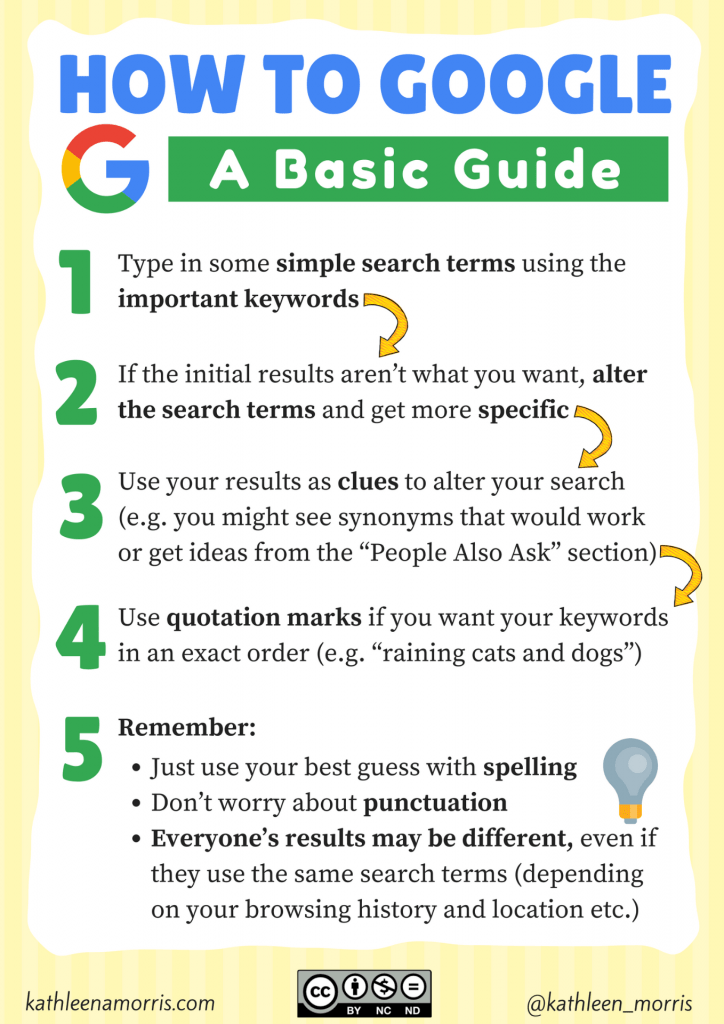
Links to learn more about Google searches
There’s lots you can learn about Google searches.
I highly recommend you take a look at 20 Instant Google Searches your Students Need to Know by Eric Curts to learn about “instant searches”.
Med Kharbach has also shared a simple visual with 12 search tips which would be really handy once students master the basics too.
The Google Search Education website is an amazing resource with lessons for beginner/intermediate/advanced plus slideshows and videos. It’s also home to the A Google A Day classroom challenges. The questions help older students learn about choosing keywords, deconstructing questions, and altering keywords.

Useful videos about Google searches
How search works.
This easy to understand video from Code.org to explains more about how search works.
How Does Google Know Everything About Me?
You might like to share this video with older students that explains how Google knows what you’re typing or thinking. Despite this algorithm, Google can’t necessarily know what you’re looking for if you’re not clear with your search terms.
What about when the answer comes up in Google instantly?
If you’ve been using Google for a while, you know they are tweaking the search formula so that more and more, an answer will show up within the Google search result itself. You won’t even need to click through to any websites.
For example, here I’ve asked when the Titanic sunk. I don’t need to go to any websites to find out. The answer is right there in front of me.
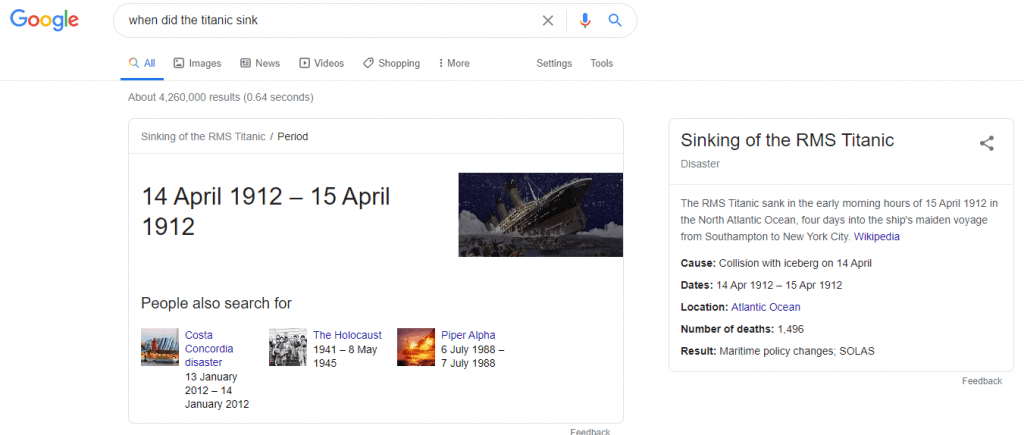
While instant searches and featured snippets are great and mean you can “get an answer” without leaving Google, students often don’t have the background knowledge to know if a result is incorrect or not. So double checking is always a good idea.
As students get older, they’ll be able to know when they can trust an answer and when double checking is needed.
Type in a subject like cats and you’ll be presented with information about the animals, sports teams, the musical along with a lot of advertising. There are a lot of topics where some background knowledge helps. And that can only be developed with time and age.
Entering quality search terms is one thing but knowing what to click on is another.
You might like to encourage students to look beyond the first few results. Let students know that Google’s PageRank algorithm is complex (as per the video above), and many websites use Search Engine Optimisation to improve the visibility of their pages in search results. That doesn’t necessarily mean they’re the most useful or relevant sites for you.
As pointed out in this article by Scientific American ,
Skilled searchers know that the ranking of results from a search engine is not a statement about objective truth, but about the best matching of the search query, term frequency, and the connectedness of web pages. Whether or not those results answer the searchers’ questions is still up for them to determine.
Point out the anatomy of a Google search result and ensure students know what all the components mean. This could be as part of a whole class discussion, or students could create their own annotations.
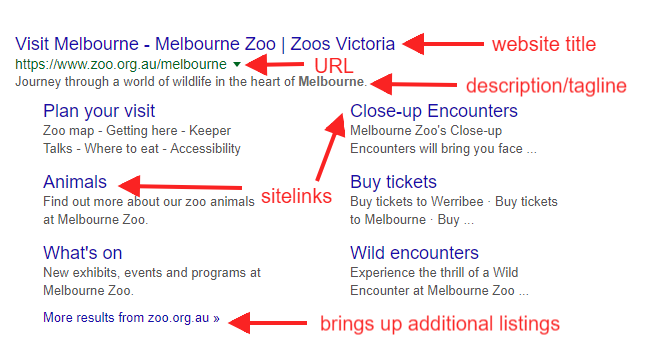
An important habit to get into is looking at the green URL and specifically the domain . Use some intuition to decide whether it seems reliable. Does the URL look like a well-known site? Is it a forum or opinion site? Is it an educational or government institution? Domains that include .gov or .edu might be more reliable sources.
When looking through possible results, you may want to teach students to open sites in new tabs, leaving their search results in a tab for easy access later (e.g. right-click on the title and click “Open link in new tab” or press Control/Command and click the link).
Searchers are often not skilled at identifying advertising within search results. A famous 2016 Stanford University study revealed that 82% of middle-schoolers couldn’t distinguish between an ad labelled “sponsored content” and a real news story.
Time spent identifying advertising within search results could help students become much more savvy searchers. Looking for the words “ad” and “sponsored” is a great place to start.
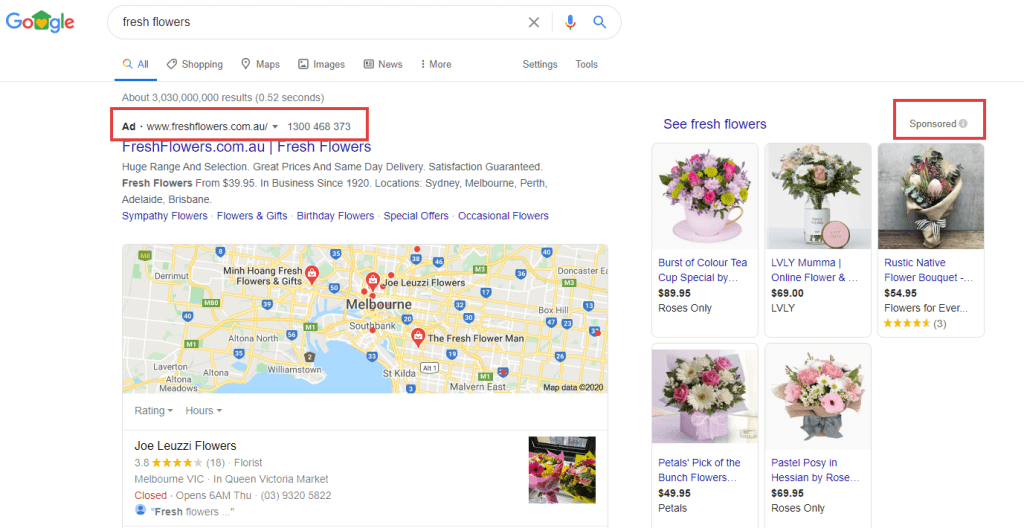
4) Evaluate
Once you click on a link and land on a site, how do you know if it offers the information you need?
Students need to know how to search for the specific information they’re after on a website. Teach students how to look for the search box on a webpage or use Control F (Command F on Mac) to bring up a search box that can scan the page.
Ensure students understand that you cannot believe everything you read . This might involve checking multiple sources. You might set up class guidelines that ask students to cross check their information on two or three different sites before assuming it’s accurate.
I’ve written a post all about teaching students how to evaluate websites . It includes this flowchart which you’re welcome to download and use in your classroom.
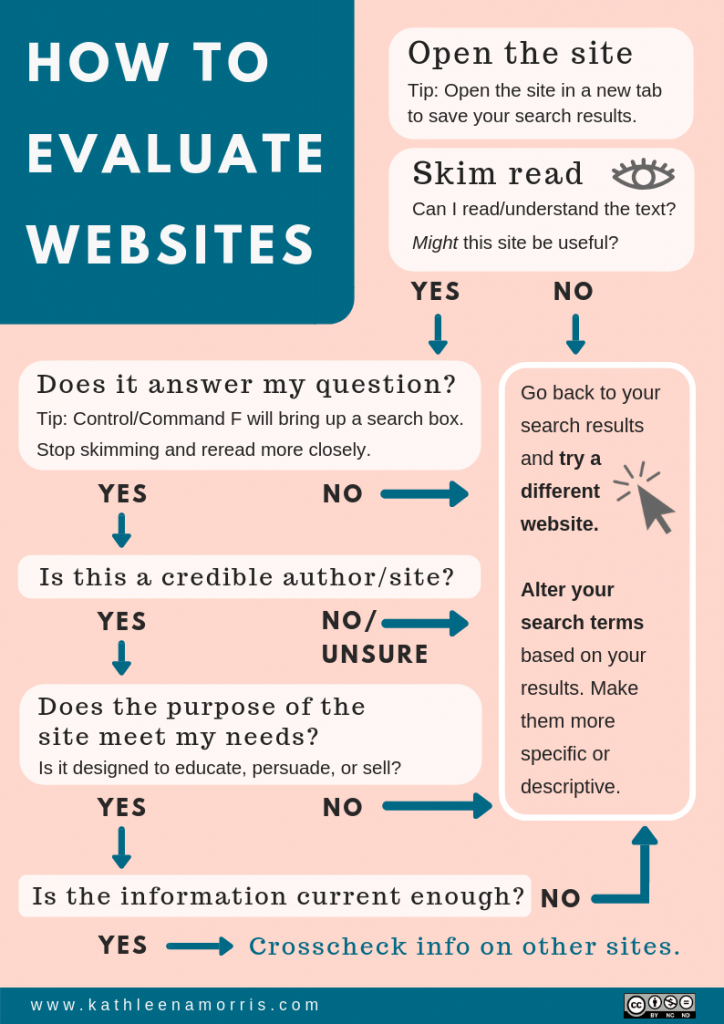
So your students navigated the obstacles of searching and finding information on quality websites. They’ve found what they need! Hooray.
Many students will instinctively want to copy and paste the information they find for their own work.
We need to inform students about plagiarism and copyright infringement while giving them the skills they need to avoid this.
- Students need to know that plagiarism is taking someone’s work and presenting it as your own. You could have a class discussion about the ethics and legalities of this.
- Students also need to be assured that they can use information from other sources and they should. They just need to say who wrote it, where it was from and so on.
All students can benefit from learning about plagiarism, copyright, how to write information in their own words, and how to acknowledge the source. However, the formality of this process will depend on your students’ age and your curriculum guidelines.
Give students lots of practice writing information in their own words. Younger students can benefit from simply putting stories or recounts in their own words. Older students could investigate the difference between paraphrasing and summarising .
There are some free online tools that summarise information for you. These aren’t perfect and aren’t a replacement from learning the skill but they could be handy for students to try out and evaluate. For example, students could try writing their own summary and then comparing it to a computer summary. I like the tool SMMRY as you can enter text or a URL of an article. Eric Curts shares a list of 7 summary tools in this blog post .
Students also need a lot of practice using quotation marks and citing sources .
The internet can offer a confusing web of information at times. Students need to be shown how to look for the primary source of information. For example, if they find information on Wikipedia, they need to cite from the bibliography at the bottom of the Wikipedia article, not Wikipedia itself.
There are many ways you can teach citation:
- I like Kathy Schrock’s PDF document which demonstrates how you can progressively teach citation from grades 1 to 6 (and beyond). It gives some clear examples that you could adapt for your own classroom use.
Staying organised!
You might also like to set up a system for students to organise their information while they’re searching. There are many apps and online tools to curate, annotate, and bookmark information, however, you could just set up a simple system like a Google Doc or Spreadsheet.
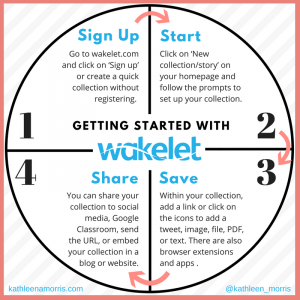
The format and function is simple and clear. This means students don’t have to put much thought into using and designing their collections. Instead, they can focus on the important curation process.
Bring These Ideas to Life With Mini-Lessons!
We know how important it is for students to have solid research skills. But how can you fit teaching research skills into a jam-packed curriculum? The answer may be … mini-lessons !
Whether you teach primary or secondary students, I’ve compiled 50 ideas for mini-lessons.
Try one a day or one a week and by the end of the school year, you might just be amazed at how independent your students are becoming with researching.
Become an Internet Search Master with This Google Slides Presentation
In early 2019, I was contacted by Noah King who is a teacher in Northern California.
Noah was teaching his students about my 5 step process outlined in this post and put together a Google Slides Presentation with elaboration and examples.
You’re welcome to use and adapt the Google Slides Presentation yourself. Find out exactly how to do this in this post.
The Presentation was designed for students around 10-11 years old but I think it could easily be adapted for different age groups.
Recap: How To Do Online Research
Despite many students being confident users of technology, they need to be taught how to find information online that’s relevant, factual, student-friendly, and safe.
Keep these six steps in mind whenever you need to do some online research:
- Clarify : What information are you looking for? Consider keywords, questions, synonyms, alternative phrases etc.
- Search : What are the best words you can type into the search engine to get the highest quality results?
- Delve : What search results should you click on and explore further?
- Evaluate : Once you click on a link and land on a site, how do you know if it offers the information you need?
- Cite : How can you write information in your own words (paraphrase or summarise), use direct quotes, and cite sources?
- Staying organised : How can you keep the valuable information you find online organised as you go through the research process?
Don’t forget to ask for help!
Lastly, remember to get help when you need it. If you’re lucky enough to have a teacher-librarian at your school, use them! They’re a wonderful resource.
If not, consult with other staff members, librarians at your local library, or members of your professional learning network. There are lots of people out there who are willing and able to help with research. You just need to ask!
Being able to research effectively is an essential skill for everyone . It’s only becoming more important as our world becomes increasingly information-saturated. Therefore, it’s definitely worth investing some classroom time in this topic.
Developing research skills doesn’t necessarily require a large chunk of time either. Integration is key and remember to fit in your mini-lessons . Model your own searches explicitly and talk out loud as you look things up.
When you’re modelling your research, go to some weak or fake websites and ask students to justify whether they think the site would be useful and reliable. Eric Curts has an excellent article where he shares four fake sites to help teach students about website evaluation. This would be a great place to start!
Introduce students to librarians ; they are a wonderful resource and often underutilised. It pays for students to know how they can collaborate with librarians for personalised help.
Finally, consider investing a little time in brushing up on research skills yourself . Everyone thinks they can “google” but many don’t realise they could do it even better (myself included!).
You Might Also Enjoy
Teaching Digital Citizenship: 10 Internet Safety Tips for Students
Free Images, Copyright, And Creative Commons: A Guide For Teachers And Students
8 Ways Teachers And Schools Can Communicate With Parents
How To Evaluate Websites: A Guide For Teachers And Students
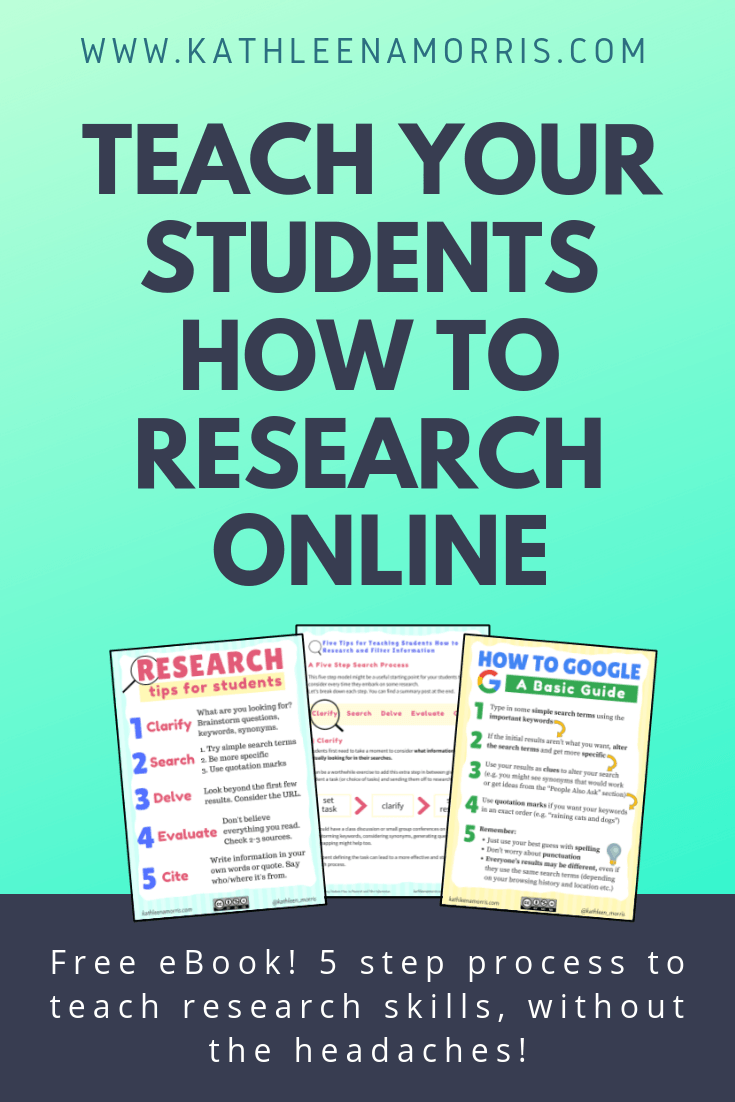
14 Replies to “How to Teach Online Research Skills to Students in 5 Steps (Free Posters)”
Kathleen, I like your point about opening up sites in new tabs. You might be interested in Mike Caulfield’s ‘four moves’ .
What a fabulous resource, Aaron. Thanks so much for sharing. This is definitely one that others should check out too. Even if teachers don’t use it with students (or are teaching young students), it could be a great source of learning for educators too.
This is great information and I found the safe search sites you provided a benefit for my children. I searched for other safe search sites and you may want to know about them. http://www.kids-search.com and http://www.safesearch.tips .
Hi Alice, great finds! Thanks so much for sharing. I like the simple interface. It’s probably a good thing there are ads at the top of the listing too. It’s an important skill for students to learn how to distinguish these. 🙂
Great website! Really useful info 🙂
I really appreciate this blog post! Teaching digital literacy can be a struggle. This topic is great for teachers, like me, who need guidance in effectively scaffolding for scholars who to use the internet to gain information.
So glad to hear it was helpful, Shasta! Good luck teaching digital literacy!
Why teachers stopped investing in themselves! Thanks a lot for the article, but this is the question I’m asking myself after all teachers referring to google as if it has everything you need ! Why it has to come from you and not the whole education system! Why it’s an option? As you said smaller children don’t need search engine in the first place! I totally agree, and I’m soo disappointed how schooling system is careless toward digital harms , the very least it’s waste of the time of my child and the most being exposed to all rubbish on the websites. I’m really disappointed that most teachers are not thinking taking care of their reputation when it comes to digital learning. Ok using you tube at school as material it’s ok , but why can’t you pay little extra to avoid adverts while teaching your children! Saving paper created mountains of electronic-toxic waste all over the world! What a degradation of education.
Thanks for sharing your thoughts, Shohida. I disagree that all schooling systems are careless towards ‘digital harms’, however, I do feel like more digital citizenship education is always important!
Hi Kathleen, I love your How to Evaluate Websites Flow Chart! I was wondering if I could have permission to have it translated into Spanish. I would like to add it to a Digital Research Toolkit that I have created for students.
Thank you! Kristen
Hi Kristen, You’re welcome to translate it! Please just leave the original attribution to my site on there. 🙂 Thanks so much for asking. I really hope it’s useful to your students! Kathleen
[…] matter how old your child is, there are many ways for them to do research into their question. For very young children, you’ll need to do the online research work. Take your time with […]
[…] digs deep into how teachers can guide students through responsible research practices on her blog (2019). She suggests a 5 step model for elementary students on how to do online […]
Writing lesson plans on the fly outside of my usual knowledge base (COVID taken down so many teachers!) and this info is precisely what I needed! Thanks!!!
Comments are closed.

IMAGES
VIDEO
COMMENTS
Online research is a research method that involves the collection of information from the internet. With the advent of the internet, the traditional pen-and-paper research techniques have taken a backseat and made room for online research design. Online surveys, online polls, questionnaires, forms, and focus groups are various tools of online ...
Librarians offer expertise in navigating resources, refining research queries, and accessing scholarly materials. Their guidance enhances the quality of your research, ensuring you make the most of available resources with precision. 6. Use library databases. Using library databases is crucial for credible research.
The Online Research Process in 6 Steps. Broadly speaking, the typical online research project goes through 6 key steps. While you probably don't tick off all these steps every time you research something online, following them can help ensure your research is complete, accurate, and useful.. Let's talk about what those steps are and why each one is worthwhile for just about any online ...
T here is a large literature on the effectiveness of various research methods, covering a variety of topics such as recruitment, interviewing, sampling, representativeness, and response rates. The pros and cons of web-based research, the focus of this editorial, have been a relatively common topic in these articles over the past 20 years (see Couper et al., 2000).
As online research becomes increasingly prevalent it becomes more important for researchers to have an answer to these questions and an approach to conducting research online. This book is a ...
The student will learn how to do effective internet research. OBJECTIVE: This two-class lesson plan leads students through a discussion of the difficulties of internet research; provides guidance on how to effectively pre-research; demonstrates online resources available for research through the Brooklyn Collection and Brooklyn Public Library ...
2. Utilize Academic Search Engines. When it comes to actual web-based research, you will find that standard search engines like Google and Bing are not that helpful. You have to use specialized search engines for academic research. Of course, Google Scholar is one such engine. But there are others too.
We have prepared a list of 10 online research tools every online learner should master. Todoist. Research is a time-intensive activity, which means you will need a tool to organize both your professional and personal life. We advise you to give Todoist a shot. Todoist enables you to manage all of your projects and access them from any platform ...
Online research is perhaps the most obvious but also the most difficult of research methods. What is Online Research? is a straightforward, accessible introduction to social research online. The book covers the key issues and concerns for all social scientists, with sections on research design, ethics and good practice. Short, clear case ...
Three keywords: social media, loneliness, teens. 3. Specify and professionalize. Think of more professional and academic synonyms for your keywords. Talk to your friends, teachers, parents and librarians to brainstorm. Make a list to keep track of what you find. Take advantage of BOOLEAN operators and modifiers to customize your research results.
The present article reviews web-based research in psychology. It captures principles, learnings, and trends in several types of web-based research that show similar developments related to web technology and its major shifts (e.g., appearance of search engines, browser wars, deep web, commercialization, web services, HTML5…) as well as distinct challenges. The types of web-based research ...
Sara Shaw, an elementary school teacher in Avon, Mass., realized she needed to teach online research skills several years ago when her students kept turning in projects riddled with misinformation ...
3. Library of Congress. As the largest library in the world, the Library of Congress is an amazing online resource for academic research. Students can search its collections to access digital resources, videos, audio recordings, photographs, and maps. The library's materials also include notated music, web archives, legislation, and 3D objects.
Create an Annotated Bibliography. As you download and read your articles during your online research, you can keep track of them by creating an "electronic notebook" which would consist of a citation of your sources. Create an entry for each source. Use the appropriate style (MLA, APA, CBE, Chicago, etc.).
TC IRB has provided a guide to help researchers determine if their activities can be considered human subjects research. Internet research is a common practice of using Internet information, especially free information on the World Wide Web or Internet-based resources (e.g., discussion forums, social media), in research. This guide will cover ...
1. Check Your Sources. The Skill: Evaluating information found in your sources based on accuracy, validity, appropriateness for needs, importance, and social and cultural context. The Challenge: While most kids know not to believe everything they read online, the majority also don't take the time to fully evaluate their sources, according to ...
A Guide to Using the Internet for Research. This is the second in a series on using the internet as a learning device. You can read part one here and part three here. We are looking at the best practices for using the Internet for research. Think of the internet as a library; it houses information on every topic you can imagine.
Internet research is the practice of using Internet information, especially free information on the World Wide Web, or Internet-based resources (like Internet discussion forum) in research.. Internet research has had a profound impact on the way ideas are formed and knowledge is created. Common applications of Internet research include personal research on a particular subject (something ...
Apr 29, 2024 — 5 min read. Read our student internet research guide for ways to search smart, check for credible sources and cite your sources. The internet is crowded! It's brimming with all kinds of information and resources. With so many choices online, it can be tricky to narrow down what you're looking for.
5 simple steps to teaching Google search tips and internet research skills for students. This updated 2020 post and free eBook shows how to research effectively online for kids in primary school, middle school and high school. These tips are summarized in a free online research skills poster for your classroom.